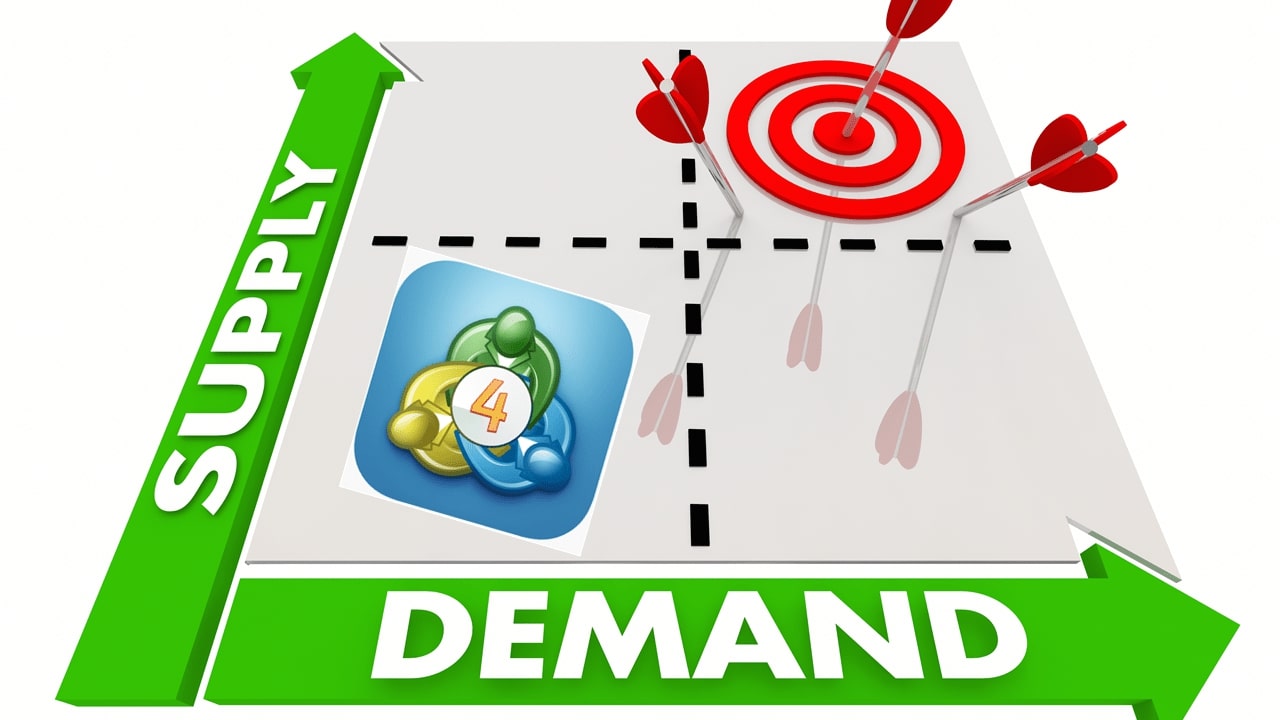 This is a whole chapter about real trading. I will talk more about money management and trading psychology. Moreover, I will also share my personal experiences when trading with the strategy: Trend + Supply Demand zones.
Of course, since it is real trading, we will have a more meticulous way of entering orders. Please read chapters 1, 2, 3 that I wrote earlier for better understanding.
Registe...
Source from : https://howtotradeblog.com/real-trading-trend-supply-demand-zones/?feed_id=1310&_unique_id=61696509b03c6
This is a whole chapter about real trading. I will talk more about money management and trading psychology. Moreover, I will also share my personal experiences when trading with the strategy: Trend + Supply Demand zones.
Of course, since it is real trading, we will have a more meticulous way of entering orders. Please read chapters 1, 2, 3 that I wrote earlier for better understanding.
Registe...
Source from : https://howtotradeblog.com/real-trading-trend-supply-demand-zones/?feed_id=1310&_unique_id=61696509b03c6
Howtotradeblog is a website to guide and share useful knowledge about trading in IQ Option, Olymp Trade, Binomo... We do not encourage you to make large amounts of money that are not realistic but to help you earn small profits every day. Website: howtotradeblog.com Youtube: https://bit.ly/howtotradeblog-youtube
Showing posts with label supplydemandzones. Show all posts
Showing posts with label supplydemandzones. Show all posts
Friday, October 15, 2021
Real Trading With Trend And Supply Demand Zones (Chapter 4)
Real Trading With Trend And Supply Demand Zones (Chapter 4)
 This is a whole chapter about real trading. I will talk more about money management and trading psychology. Moreover, I will also share my personal experiences when trading with the strategy: Trend + Supply Demand zones.
Of course, since it is real trading, we will have a more meticulous way of entering orders. Please read chapters 1, 2, 3 that I wrote earlier for better understanding.
Registe...
Source from : https://howtotradeblog.com/real-trading-trend-supply-demand-zones/?feed_id=1310&_unique_id=61696509b03c6
This is a whole chapter about real trading. I will talk more about money management and trading psychology. Moreover, I will also share my personal experiences when trading with the strategy: Trend + Supply Demand zones.
Of course, since it is real trading, we will have a more meticulous way of entering orders. Please read chapters 1, 2, 3 that I wrote earlier for better understanding.
Registe...
Source from : https://howtotradeblog.com/real-trading-trend-supply-demand-zones/?feed_id=1310&_unique_id=61696509b03c6
 This is a whole chapter about real trading. I will talk more about money management and trading psychology. Moreover, I will also share my personal experiences when trading with the strategy: Trend + Supply Demand zones.
Of course, since it is real trading, we will have a more meticulous way of entering orders. Please read chapters 1, 2, 3 that I wrote earlier for better understanding.
Registe...
Source from : https://howtotradeblog.com/real-trading-trend-supply-demand-zones/?feed_id=1310&_unique_id=61696509b03c6
This is a whole chapter about real trading. I will talk more about money management and trading psychology. Moreover, I will also share my personal experiences when trading with the strategy: Trend + Supply Demand zones.
Of course, since it is real trading, we will have a more meticulous way of entering orders. Please read chapters 1, 2, 3 that I wrote earlier for better understanding.
Registe...
Source from : https://howtotradeblog.com/real-trading-trend-supply-demand-zones/?feed_id=1310&_unique_id=61696509b03c6
What Are Supply and Demand Zones? The Idea Of This Strategy? (Chapter 1)
What Are Supply and Demand Zones? The Idea Of This Strategy? (Chapter 1)
 “Following the footsteps of Big Boys or big organizations in the market,
you will make money.”
This is the motto of those who prefer the school of trading according to the Supply and Demand zones.
This is one of the best trading systems you need to know. Let's start from chapter 1 to chapter 4. I believe you will have useful knowledge after reading this series.
Register an Exness account No...
Source from : https://howtotradeblog.com/what-are-supply-and-demand-zones/?feed_id=1309&_unique_id=61696462e5756
“Following the footsteps of Big Boys or big organizations in the market,
you will make money.”
This is the motto of those who prefer the school of trading according to the Supply and Demand zones.
This is one of the best trading systems you need to know. Let's start from chapter 1 to chapter 4. I believe you will have useful knowledge after reading this series.
Register an Exness account No...
Source from : https://howtotradeblog.com/what-are-supply-and-demand-zones/?feed_id=1309&_unique_id=61696462e5756
 “Following the footsteps of Big Boys or big organizations in the market,
you will make money.”
This is the motto of those who prefer the school of trading according to the Supply and Demand zones.
This is one of the best trading systems you need to know. Let's start from chapter 1 to chapter 4. I believe you will have useful knowledge after reading this series.
Register an Exness account No...
Source from : https://howtotradeblog.com/what-are-supply-and-demand-zones/?feed_id=1309&_unique_id=61696462e5756
“Following the footsteps of Big Boys or big organizations in the market,
you will make money.”
This is the motto of those who prefer the school of trading according to the Supply and Demand zones.
This is one of the best trading systems you need to know. Let's start from chapter 1 to chapter 4. I believe you will have useful knowledge after reading this series.
Register an Exness account No...
Source from : https://howtotradeblog.com/what-are-supply-and-demand-zones/?feed_id=1309&_unique_id=61696462e5756
How To Use Trend Trading With Supply And Demand zones (Chapter 3)
I write this article from my own experience after practicing trend trading with Supply and Demand zones for months. Hope you can gain more knowledge after trading this strategy.
In this chapter, I will guide you on how to enter orders and the reason behind them. And the real trading orders will be in chapter 4.
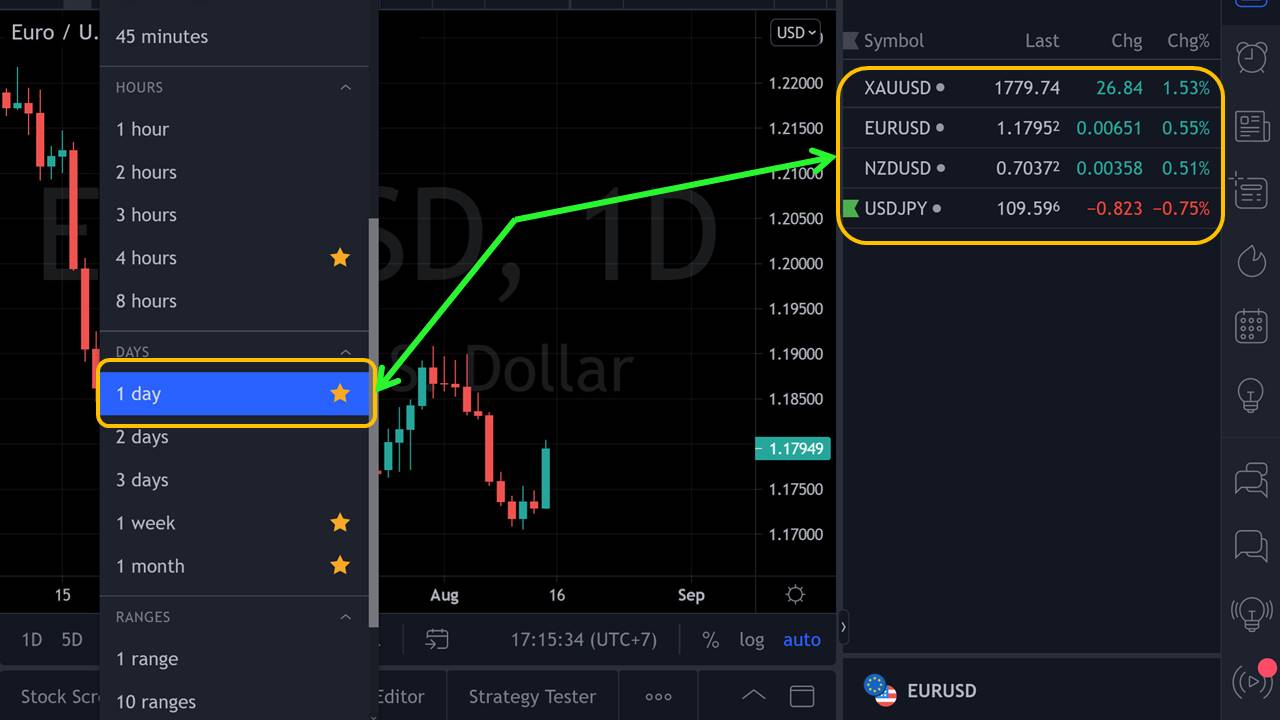 Trading conditions for Trend and Supply Demand strategy[/caption]
- I manage money according to the Risk/Reward ratio (R/R). There is a specific guide below to help you set up Stop Loss (SL) and Take Profit (TP).
If you still don’t understand the uptrend and downtrend clearly, please read the two articles below.
+ What is an uptrend? How to trade Forex effectively in an uptrend.
+ What is a downtrend in Forex? How to trade Forex with a downtrend.
– We will trade with 2 steps:
+ Step 1: Identify the main Trend and Supply and Demand zones created by the market.
+ Step 2: Wait for the price to retest the Supply or Demand zone and enter an order. In an uptrend, we’ll BUY. On the contrary, we’ll SELL in a downtrend.
Trading conditions for Trend and Supply Demand strategy[/caption]
- I manage money according to the Risk/Reward ratio (R/R). There is a specific guide below to help you set up Stop Loss (SL) and Take Profit (TP).
If you still don’t understand the uptrend and downtrend clearly, please read the two articles below.
+ What is an uptrend? How to trade Forex effectively in an uptrend.
+ What is a downtrend in Forex? How to trade Forex with a downtrend.
– We will trade with 2 steps:
+ Step 1: Identify the main Trend and Supply and Demand zones created by the market.
+ Step 2: Wait for the price to retest the Supply or Demand zone and enter an order. In an uptrend, we’ll BUY. On the contrary, we’ll SELL in a downtrend.
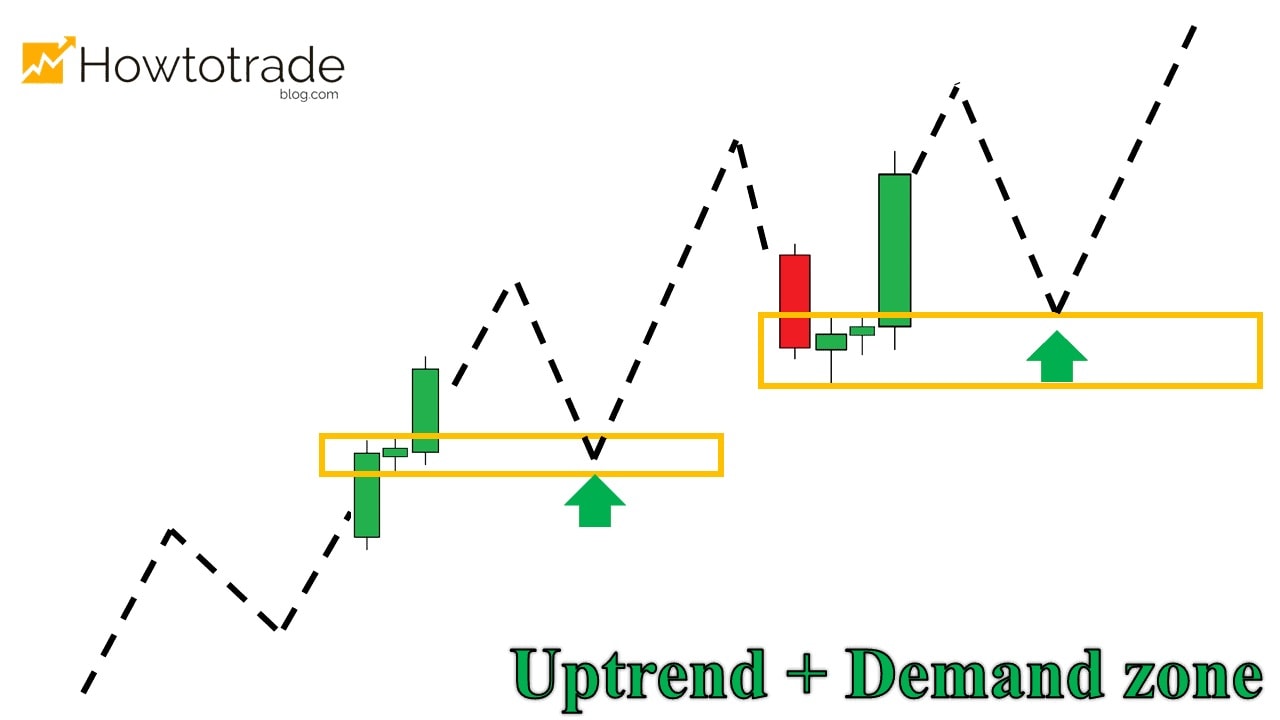 How to enter BUY orders[/caption]
For detailed example with USD/JPY (from January 27, 2021 to February 17, 2021)
The USD/JPY entered an uptrend period.
Identified and drew the Demand zone on the chart (yellow area). My job was to wait for the price to come back and retest this zone and open a BUY order.
[caption id="attachment_16589" align="aligncenter" width="1920"]
How to enter BUY orders[/caption]
For detailed example with USD/JPY (from January 27, 2021 to February 17, 2021)
The USD/JPY entered an uptrend period.
Identified and drew the Demand zone on the chart (yellow area). My job was to wait for the price to come back and retest this zone and open a BUY order.
[caption id="attachment_16589" align="aligncenter" width="1920"]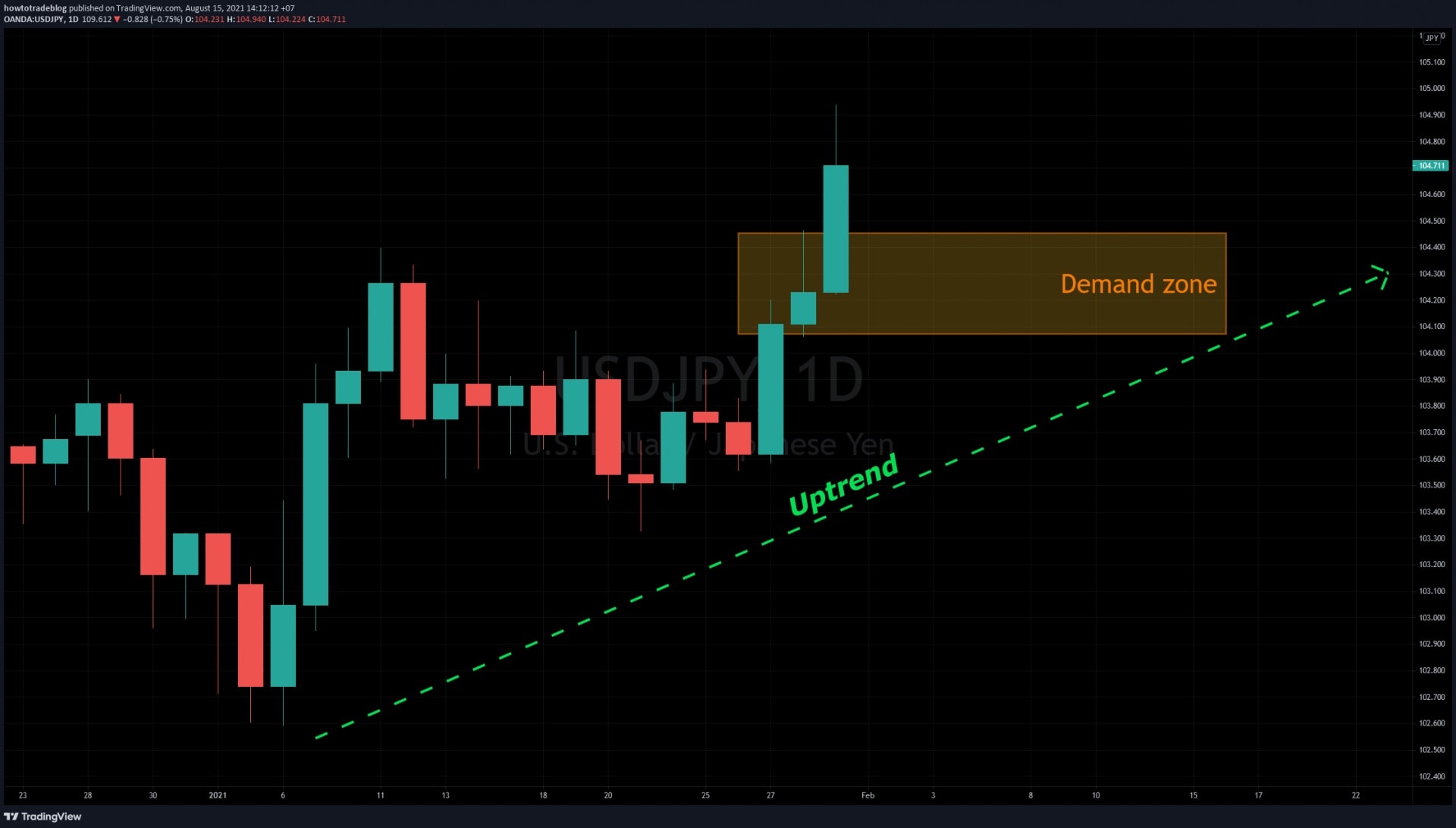 Identify the Demand zone in the Uptrend[/caption]
The price retested the Demand zone that I drew and created a trading signal with a Doji candlestick.
+ Opened a BUY order right away.
+ Set the SL below the Demand zone.
+ Set the TP at the previous top.
[caption id="attachment_16590" align="aligncenter" width="1920"]
Identify the Demand zone in the Uptrend[/caption]
The price retested the Demand zone that I drew and created a trading signal with a Doji candlestick.
+ Opened a BUY order right away.
+ Set the SL below the Demand zone.
+ Set the TP at the previous top.
[caption id="attachment_16590" align="aligncenter" width="1920"]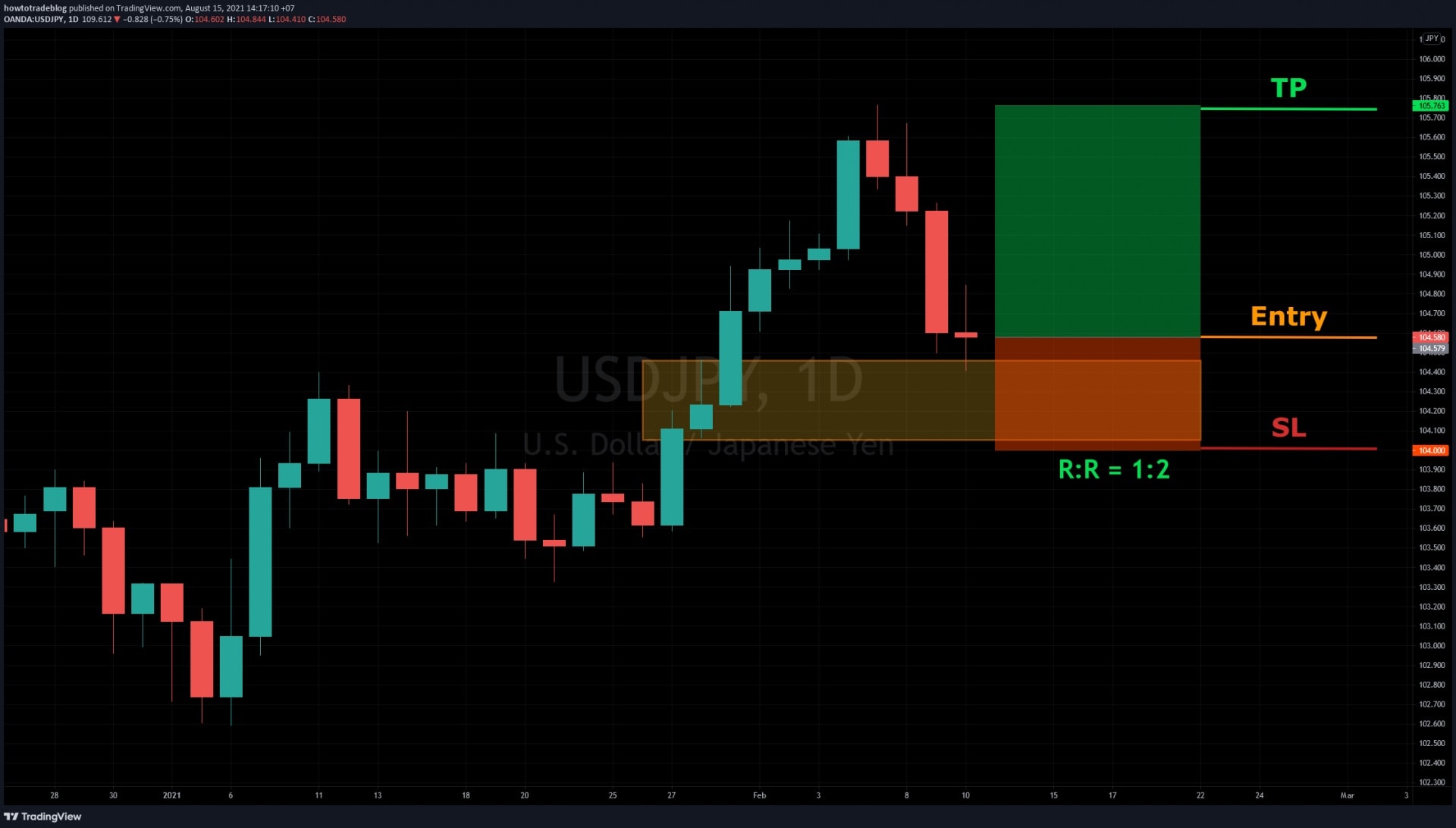 Open a BUY trade[/caption]
The price bounced back to the TP point. In this trade, I won 2R.
[caption id="attachment_16591" align="aligncenter" width="1920"]
Open a BUY trade[/caption]
The price bounced back to the TP point. In this trade, I won 2R.
[caption id="attachment_16591" align="aligncenter" width="1920"]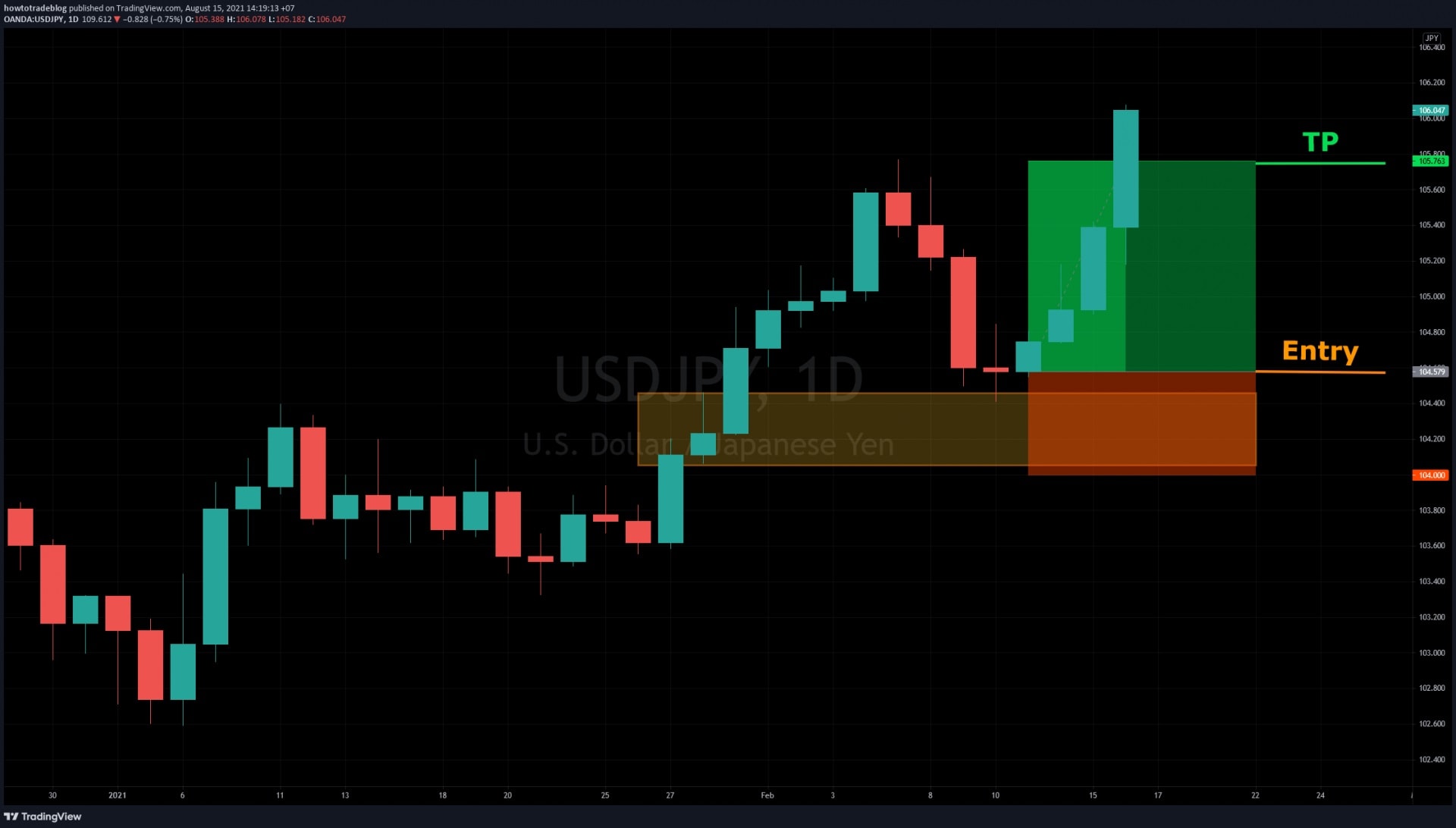 A nice result with 2R profit[/caption]
A nice result with 2R profit[/caption]
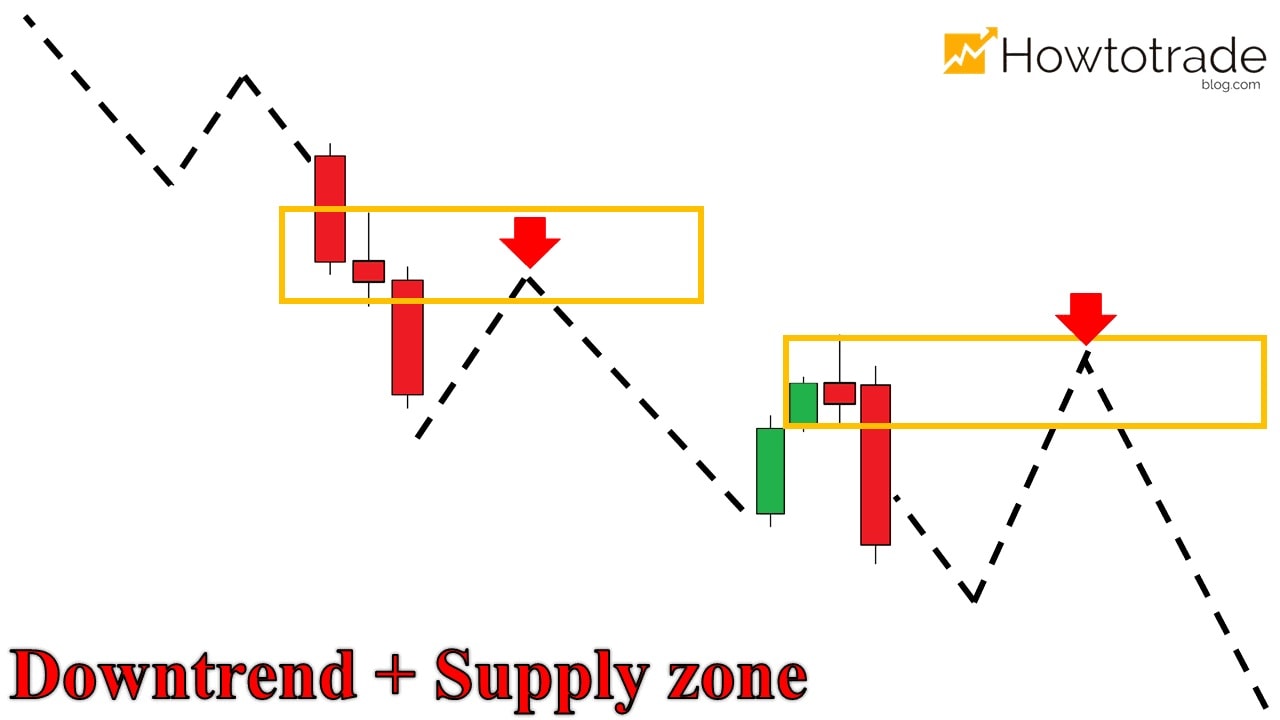 How to open SELL orders[/caption]
For specific example with USD/JPY (from July 5, 2021 to August 5, 2021)
USD/JPY was in a downtrend. This decreasing process created the Supply Zone (yellow area) on the chart. This was the main zone I waited for a SELL order.
[caption id="attachment_16593" align="aligncenter" width="1920"]
How to open SELL orders[/caption]
For specific example with USD/JPY (from July 5, 2021 to August 5, 2021)
USD/JPY was in a downtrend. This decreasing process created the Supply Zone (yellow area) on the chart. This was the main zone I waited for a SELL order.
[caption id="attachment_16593" align="aligncenter" width="1920"]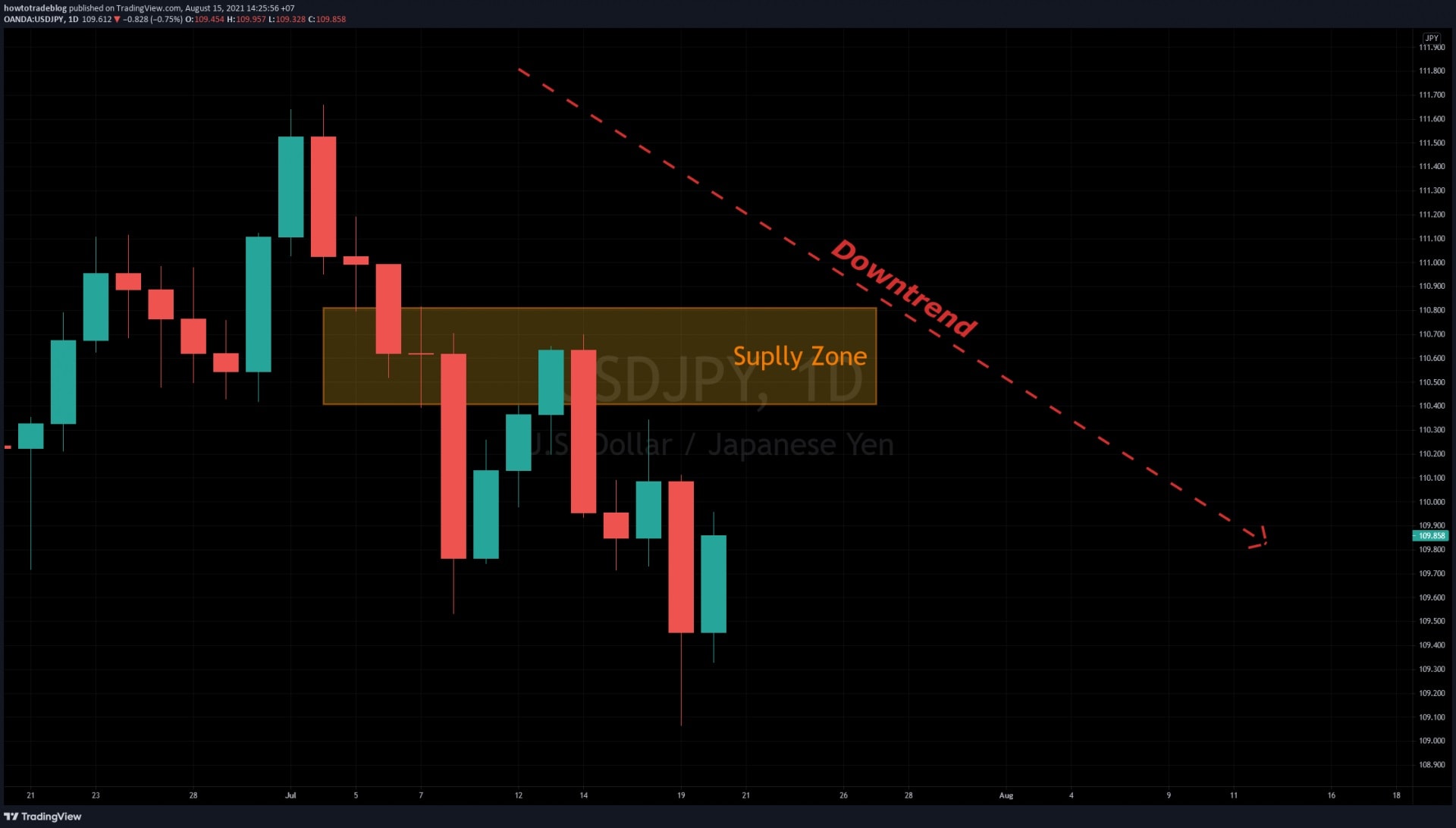 Identify the Supply zone in a downtrend[/caption]
The price moved back to the Supply zone and showed signs of reversal.
+ Entered a SELL order here.
+ Set the SL above the Supply zone.
+ Set the TP at the previous bottom.
[caption id="attachment_16594" align="aligncenter" width="1920"]
Identify the Supply zone in a downtrend[/caption]
The price moved back to the Supply zone and showed signs of reversal.
+ Entered a SELL order here.
+ Set the SL above the Supply zone.
+ Set the TP at the previous bottom.
[caption id="attachment_16594" align="aligncenter" width="1920"]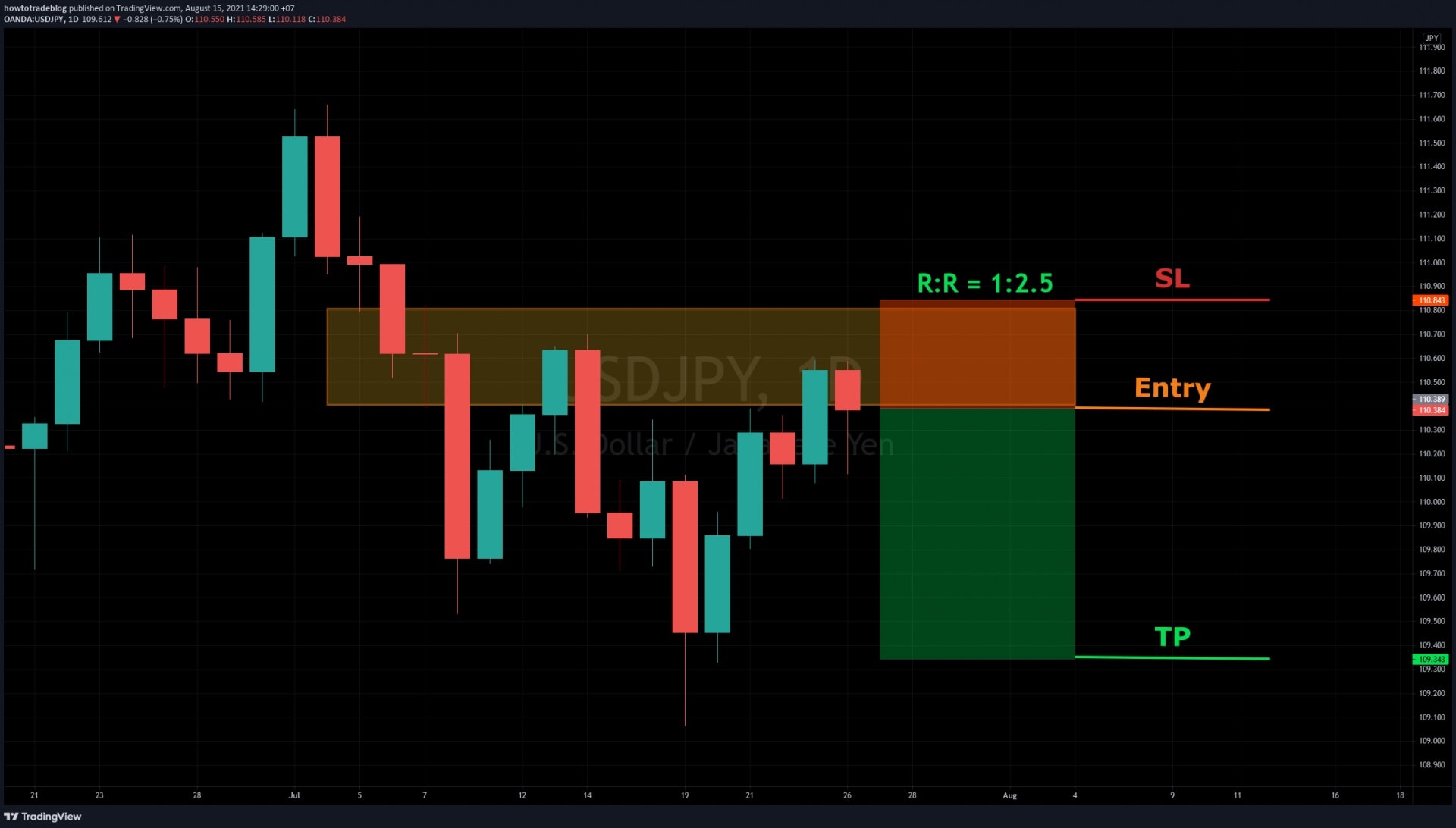 Enter a SELL order in the Supply zone[/caption]
Result: This SELL order has reached the TP with 2.5R.
[caption id="attachment_16595" align="aligncenter" width="1920"]
Enter a SELL order in the Supply zone[/caption]
Result: This SELL order has reached the TP with 2.5R.
[caption id="attachment_16595" align="aligncenter" width="1920"]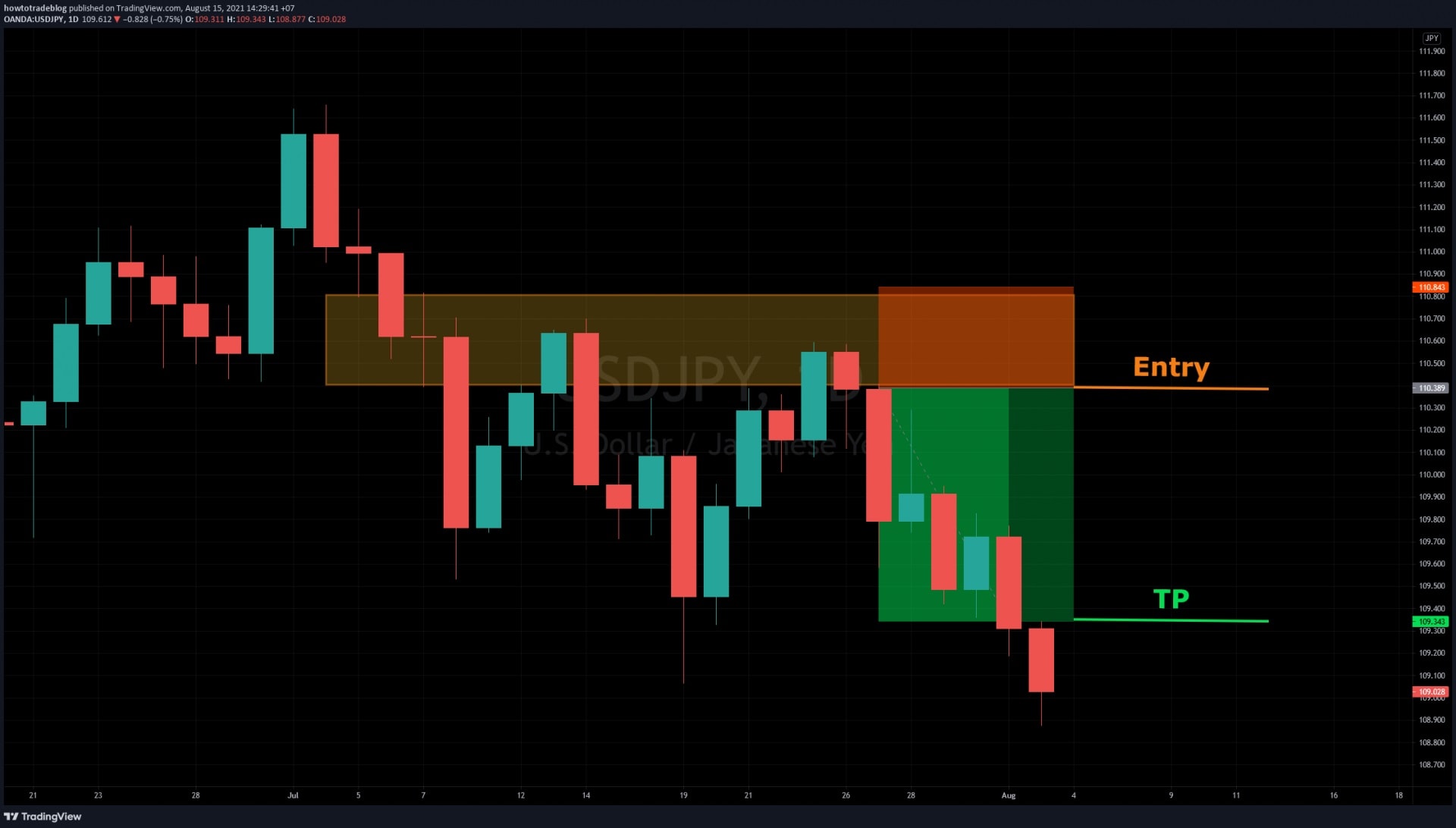 Sell order results with 2.5R profit[/caption]
Sell order results with 2.5R profit[/caption]
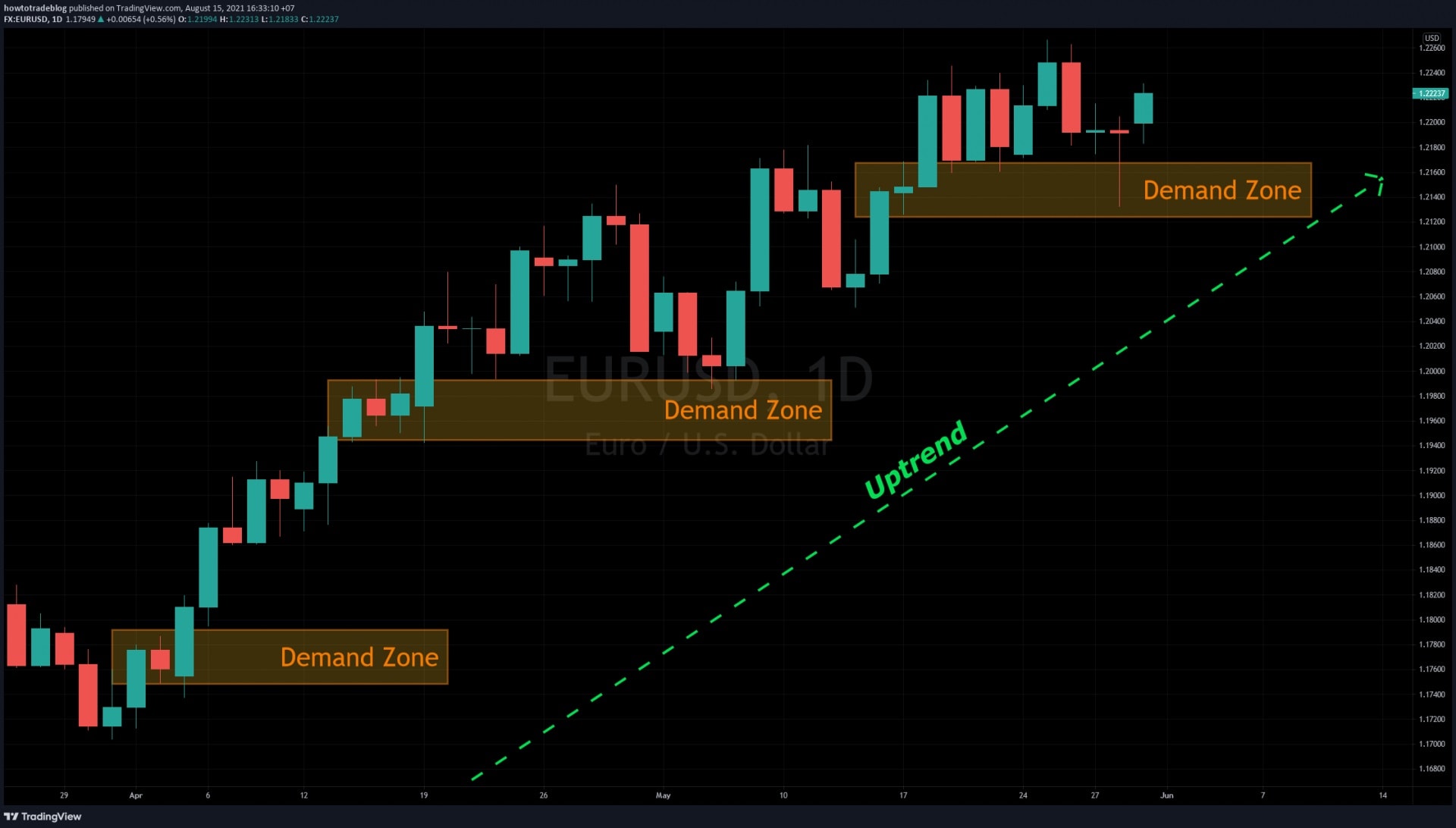 Identifying the main trend of the market is the top priority[/caption]
Identifying the main trend of the market is the top priority[/caption]
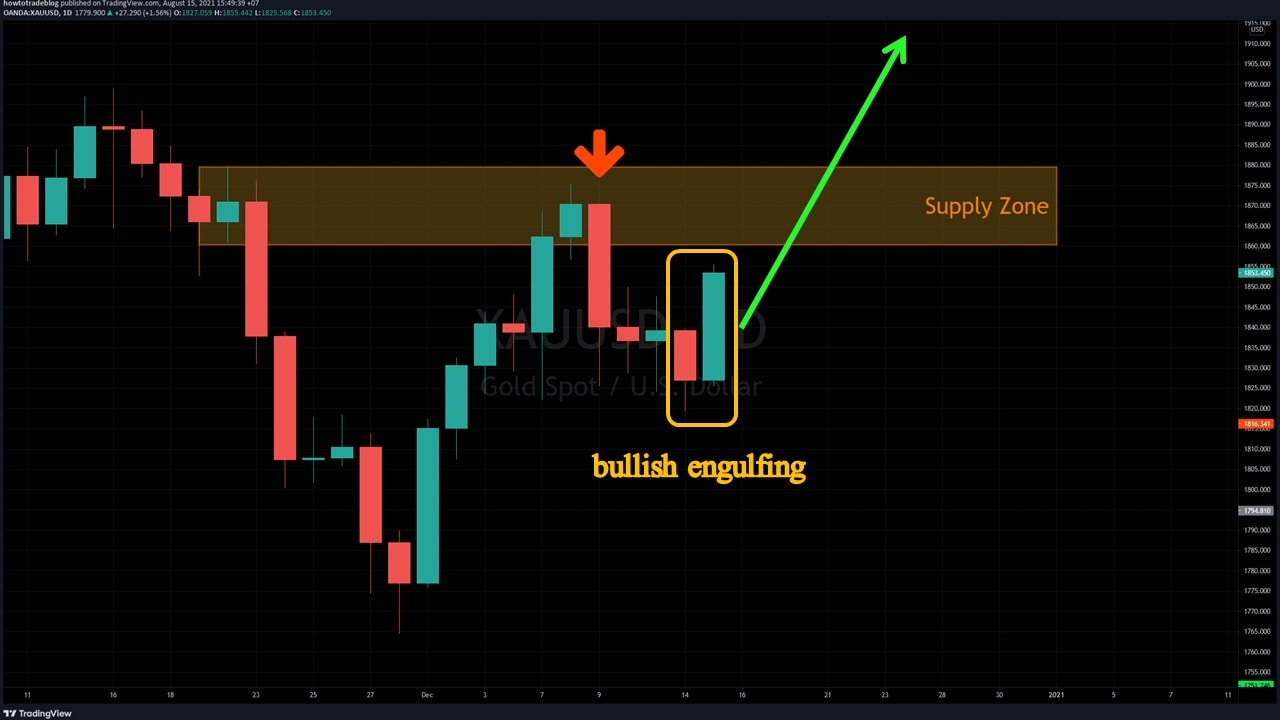 The signal when Supply and Demand zones could be broken[/caption]
The signal when Supply and Demand zones could be broken[/caption]
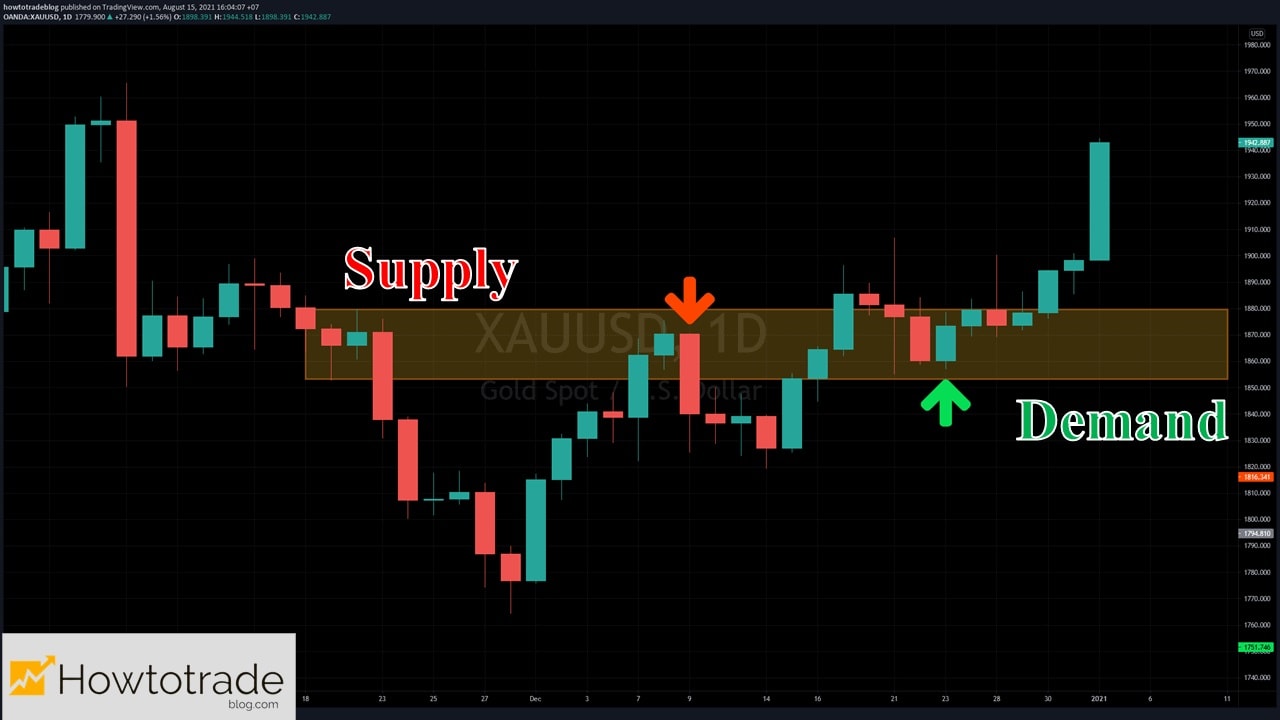 Swap between Supply and Demand[/caption]
Swap between Supply and Demand[/caption]
Register an Exness account NowGet $1,000 Free for beginners
Conditions of the strategy
– I use the daily chart to analyze and predict the price because I'm not a day trader. I don't focus 100% of my time on making money in the markets. So I use the daily chart to slow things down. – Some of my favorite currency pairs are USD/JPY, EUR/USD, NZD/USD, GOLD (XAU/USD). Because everyone has their strengths, I'm only focusing on a few currency pairs that I understand well. If you’re in favor of the currency pairs above, EUR/JPY or GBP/JPY is also worth a try. [caption id="attachment_16587" align="aligncenter" width="1280"] Trading conditions for Trend and Supply Demand strategy[/caption]
- I manage money according to the Risk/Reward ratio (R/R). There is a specific guide below to help you set up Stop Loss (SL) and Take Profit (TP).
If you still don’t understand the uptrend and downtrend clearly, please read the two articles below.
+ What is an uptrend? How to trade Forex effectively in an uptrend.
+ What is a downtrend in Forex? How to trade Forex with a downtrend.
– We will trade with 2 steps:
+ Step 1: Identify the main Trend and Supply and Demand zones created by the market.
+ Step 2: Wait for the price to retest the Supply or Demand zone and enter an order. In an uptrend, we’ll BUY. On the contrary, we’ll SELL in a downtrend.
Trading conditions for Trend and Supply Demand strategy[/caption]
- I manage money according to the Risk/Reward ratio (R/R). There is a specific guide below to help you set up Stop Loss (SL) and Take Profit (TP).
If you still don’t understand the uptrend and downtrend clearly, please read the two articles below.
+ What is an uptrend? How to trade Forex effectively in an uptrend.
+ What is a downtrend in Forex? How to trade Forex with a downtrend.
– We will trade with 2 steps:
+ Step 1: Identify the main Trend and Supply and Demand zones created by the market.
+ Step 2: Wait for the price to retest the Supply or Demand zone and enter an order. In an uptrend, we’ll BUY. On the contrary, we’ll SELL in a downtrend.
Detailed guide on how to trade
BUY order
First, you need to identify the Uptrend and the Demand Zone. The theory goes like this. During the increasing process in an uptrend, the market will create demand zones. We will open BUY orders in these zones. [caption id="attachment_16588" align="aligncenter" width="1280"] How to enter BUY orders[/caption]
For detailed example with USD/JPY (from January 27, 2021 to February 17, 2021)
The USD/JPY entered an uptrend period.
Identified and drew the Demand zone on the chart (yellow area). My job was to wait for the price to come back and retest this zone and open a BUY order.
[caption id="attachment_16589" align="aligncenter" width="1920"]
How to enter BUY orders[/caption]
For detailed example with USD/JPY (from January 27, 2021 to February 17, 2021)
The USD/JPY entered an uptrend period.
Identified and drew the Demand zone on the chart (yellow area). My job was to wait for the price to come back and retest this zone and open a BUY order.
[caption id="attachment_16589" align="aligncenter" width="1920"] Identify the Demand zone in the Uptrend[/caption]
The price retested the Demand zone that I drew and created a trading signal with a Doji candlestick.
+ Opened a BUY order right away.
+ Set the SL below the Demand zone.
+ Set the TP at the previous top.
[caption id="attachment_16590" align="aligncenter" width="1920"]
Identify the Demand zone in the Uptrend[/caption]
The price retested the Demand zone that I drew and created a trading signal with a Doji candlestick.
+ Opened a BUY order right away.
+ Set the SL below the Demand zone.
+ Set the TP at the previous top.
[caption id="attachment_16590" align="aligncenter" width="1920"] Open a BUY trade[/caption]
The price bounced back to the TP point. In this trade, I won 2R.
[caption id="attachment_16591" align="aligncenter" width="1920"]
Open a BUY trade[/caption]
The price bounced back to the TP point. In this trade, I won 2R.
[caption id="attachment_16591" align="aligncenter" width="1920"] A nice result with 2R profit[/caption]
A nice result with 2R profit[/caption]
SELL order
In theory, the price keeps falling and enters a Downtrend. Identify the Supply zones that the market has created. Wait for the signal to open the SELL order. [caption id="attachment_16592" align="alignnone" width="1280"] How to open SELL orders[/caption]
For specific example with USD/JPY (from July 5, 2021 to August 5, 2021)
USD/JPY was in a downtrend. This decreasing process created the Supply Zone (yellow area) on the chart. This was the main zone I waited for a SELL order.
[caption id="attachment_16593" align="aligncenter" width="1920"]
How to open SELL orders[/caption]
For specific example with USD/JPY (from July 5, 2021 to August 5, 2021)
USD/JPY was in a downtrend. This decreasing process created the Supply Zone (yellow area) on the chart. This was the main zone I waited for a SELL order.
[caption id="attachment_16593" align="aligncenter" width="1920"] Identify the Supply zone in a downtrend[/caption]
The price moved back to the Supply zone and showed signs of reversal.
+ Entered a SELL order here.
+ Set the SL above the Supply zone.
+ Set the TP at the previous bottom.
[caption id="attachment_16594" align="aligncenter" width="1920"]
Identify the Supply zone in a downtrend[/caption]
The price moved back to the Supply zone and showed signs of reversal.
+ Entered a SELL order here.
+ Set the SL above the Supply zone.
+ Set the TP at the previous bottom.
[caption id="attachment_16594" align="aligncenter" width="1920"] Enter a SELL order in the Supply zone[/caption]
Result: This SELL order has reached the TP with 2.5R.
[caption id="attachment_16595" align="aligncenter" width="1920"]
Enter a SELL order in the Supply zone[/caption]
Result: This SELL order has reached the TP with 2.5R.
[caption id="attachment_16595" align="aligncenter" width="1920"] Sell order results with 2.5R profit[/caption]
Sell order results with 2.5R profit[/caption]
The lessons I draw after using Trend trading and Supply Demand
Trend is the most important
Remember that the main trend of the market is the first thing you should pay attention to. Then come to the Supply and Demand zones. If it is Uptrend, find the Demand zone. Conversely, in the downtrend, you focus on the Supply zone. [caption id="attachment_16596" align="aligncenter" width="1920"] Identifying the main trend of the market is the top priority[/caption]
Identifying the main trend of the market is the top priority[/caption]
Trading signals
Balanced candlesticks like Doji in the Supply Demand zone are good signals for you to consider opening an order. We will discuss this in detail on the next chapter. When the market has no good signal for you to BUY or SELL at the Supply and Demand zones, ignore it. Be patient to wait for a really nice one. Do not rush because you will always have another chance.The signal when Supply and Demand zones could be broken
Be careful with the Engulfing candlestick pattern or the inverted Pin Bar candlesticks. When the above signals appear, you can consider closing the order. [caption id="attachment_16597" align="aligncenter" width="1280"] The signal when Supply and Demand zones could be broken[/caption]
The signal when Supply and Demand zones could be broken[/caption]
How long do the Supply and Demand zones become meaningless?
In theory with the daily chart, if the market does not return to the Supply or Demand zone within 1 month, that zone will become meaningless. But in reality and my opinion, we will have a plan to execute orders according to how the market reacts.Swap between Supply and Demand
When the Supply zone is broken, it will change its role to the Demand zone and vice versa. This is quite similar to the support and resistance. [caption id="attachment_16598" align="aligncenter" width="1280"] Swap between Supply and Demand[/caption]
Swap between Supply and Demand[/caption]
Conclusion
So we have finished the Trend + Supply/Demand strategy. Please read it again and practice on the Tradingview basic account. Don’t worry. The basic account is completely free. I will continue to show how to trade Forex and Gold for real on MT4 in the next article. There will be a detailed analysis together with trading psychology too. Please wait for it.How To Identify And Trade With Supply And Demand Zones (Chapter 2)
In this article, I will present 2 main topics.
– Instructions on how to identify a Supply or Demand zone.
– How to BUY/SELL, how to set Stop Loss, Take Profit with them in Forex trading.
If you do not know what Supply and Demand zones are, you can read this article: What Are Supply and Demand Zones? The Idea Of This Strategy?
Ok! Now let's go through each part so you can fully understand the strategy.
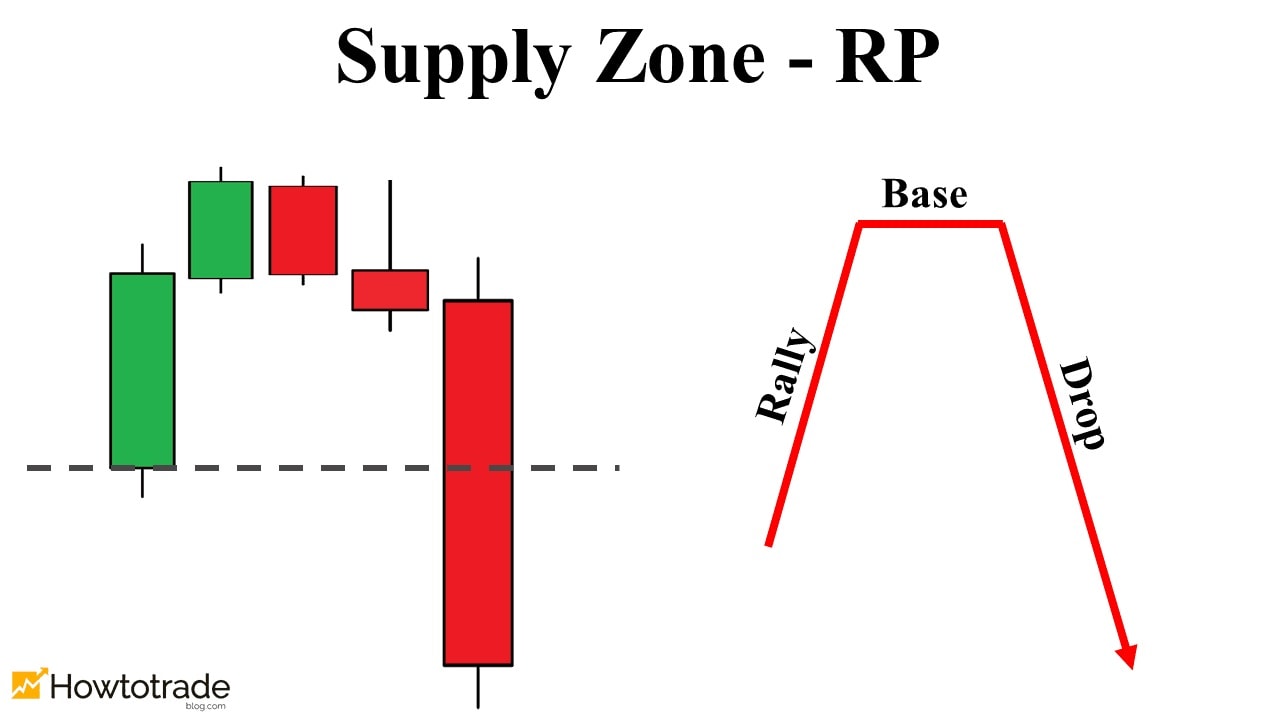 Reversal Supply pattern[/caption]
The price moves sideways after an uptrend and creates a sideways candlestick zone called the Base. Then it falls dramatically with a long body candlestick. This Base is the reversal Supply zone (RP).
For example:
[caption id="attachment_16530" align="aligncenter" width="1920"]
Reversal Supply pattern[/caption]
The price moves sideways after an uptrend and creates a sideways candlestick zone called the Base. Then it falls dramatically with a long body candlestick. This Base is the reversal Supply zone (RP).
For example:
[caption id="attachment_16530" align="aligncenter" width="1920"]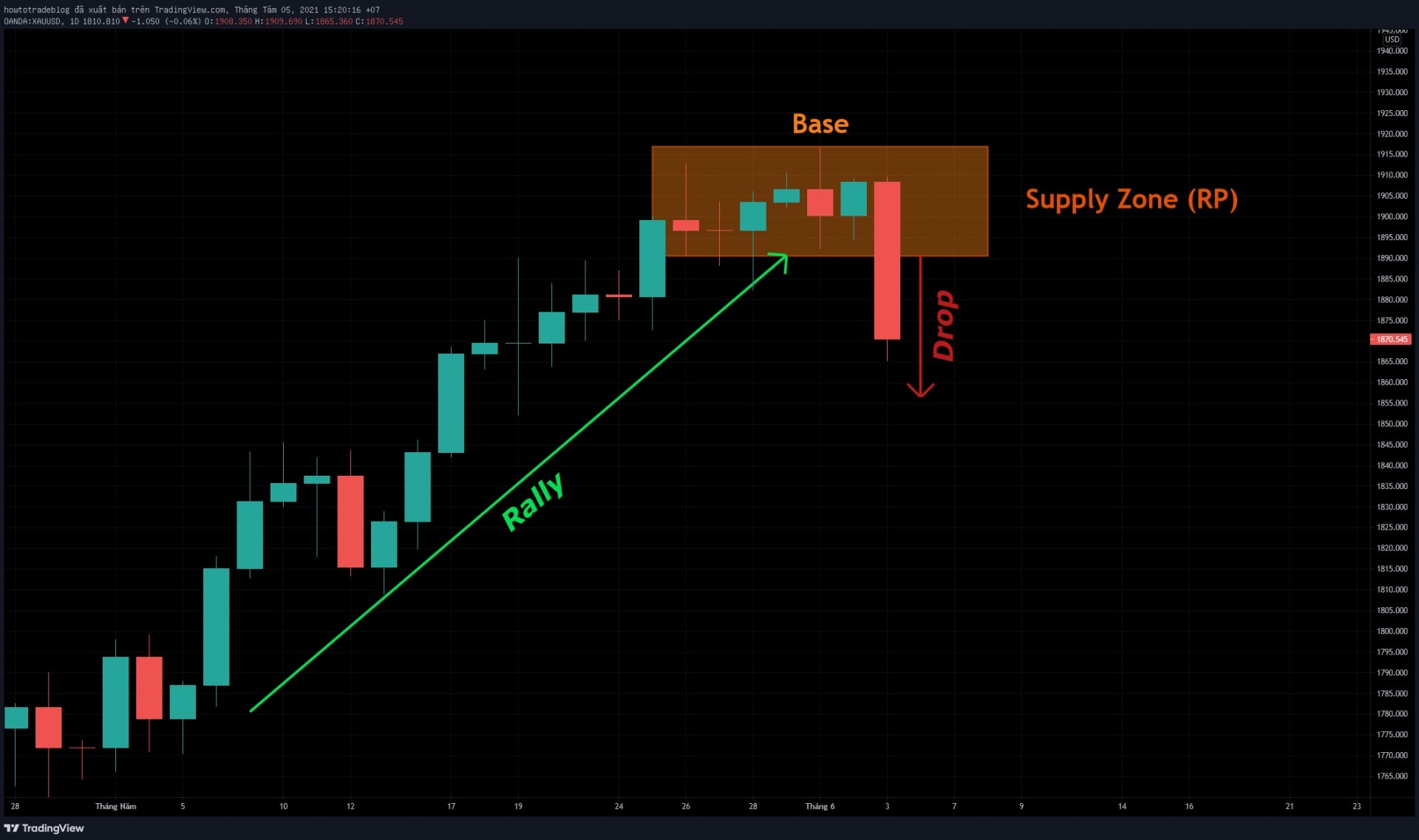 An example of the reversal Supply pattern[/caption]
The 6 candlesticks moving sideways in the image above are the Base. When the gold price falls sharply and creates a red candlestick with a long body, this Base becomes the reversal Supply zone.
(2) Continuation pattern (CP): Drop – Base – Drop
[caption id="attachment_16531" align="aligncenter" width="1280"]
An example of the reversal Supply pattern[/caption]
The 6 candlesticks moving sideways in the image above are the Base. When the gold price falls sharply and creates a red candlestick with a long body, this Base becomes the reversal Supply zone.
(2) Continuation pattern (CP): Drop – Base – Drop
[caption id="attachment_16531" align="aligncenter" width="1280"]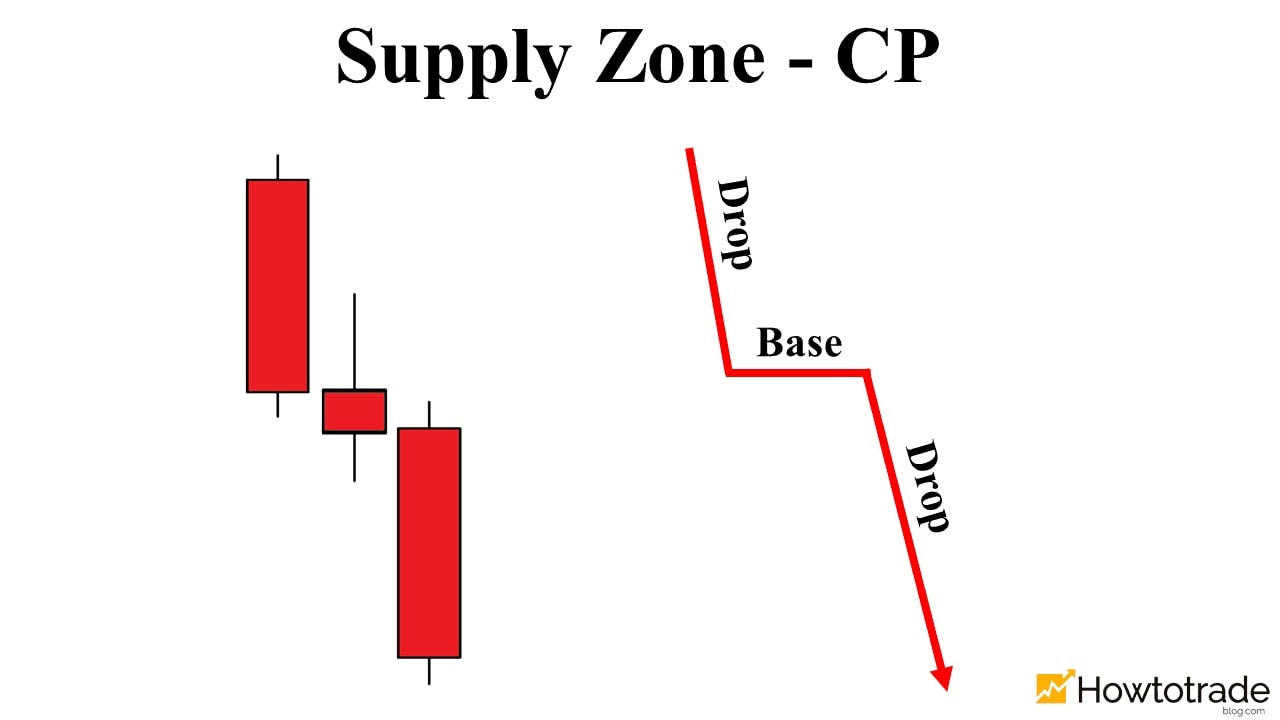 Continuation Supply zone[/caption]
The price stops decreasing and creates sideways candlesticks. Then it continues to fall significantly. The sideways zone (Base) in this process will be the Supply zone.
Detailed example:
[caption id="attachment_16532" align="aligncenter" width="1920"]
Continuation Supply zone[/caption]
The price stops decreasing and creates sideways candlesticks. Then it continues to fall significantly. The sideways zone (Base) in this process will be the Supply zone.
Detailed example:
[caption id="attachment_16532" align="aligncenter" width="1920"]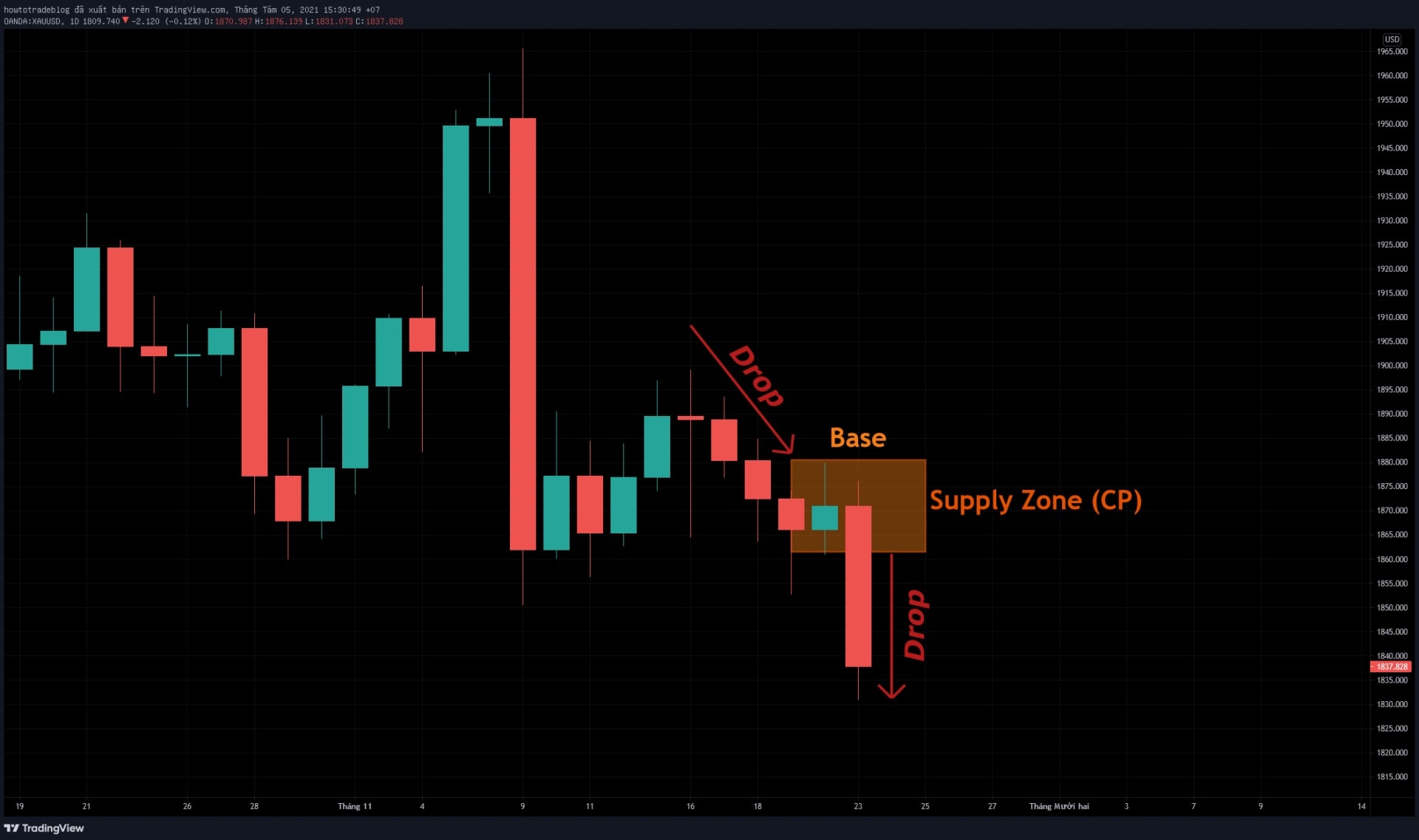 An example of the continuation Supply pattern[/caption]
An example of the continuation Supply pattern[/caption]
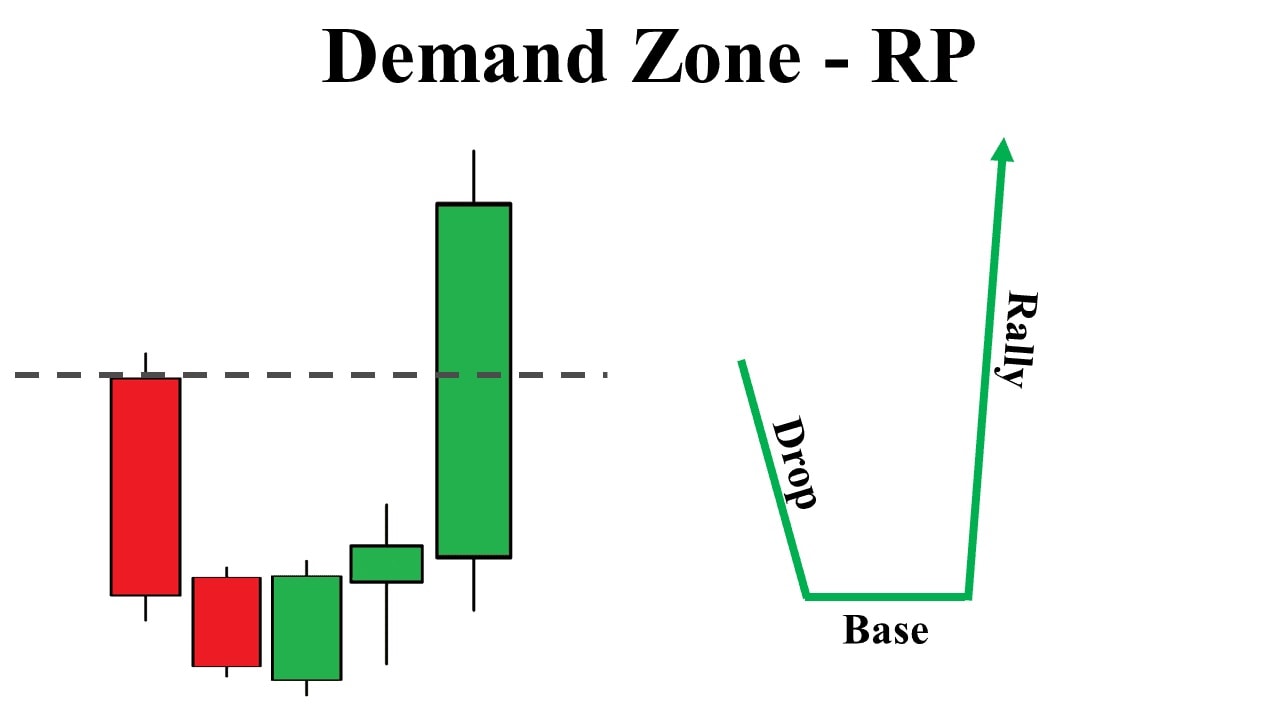 Reversal Demand pattern[/caption]
For example:
[caption id="attachment_16534" align="aligncenter" width="1920"]
Reversal Demand pattern[/caption]
For example:
[caption id="attachment_16534" align="aligncenter" width="1920"]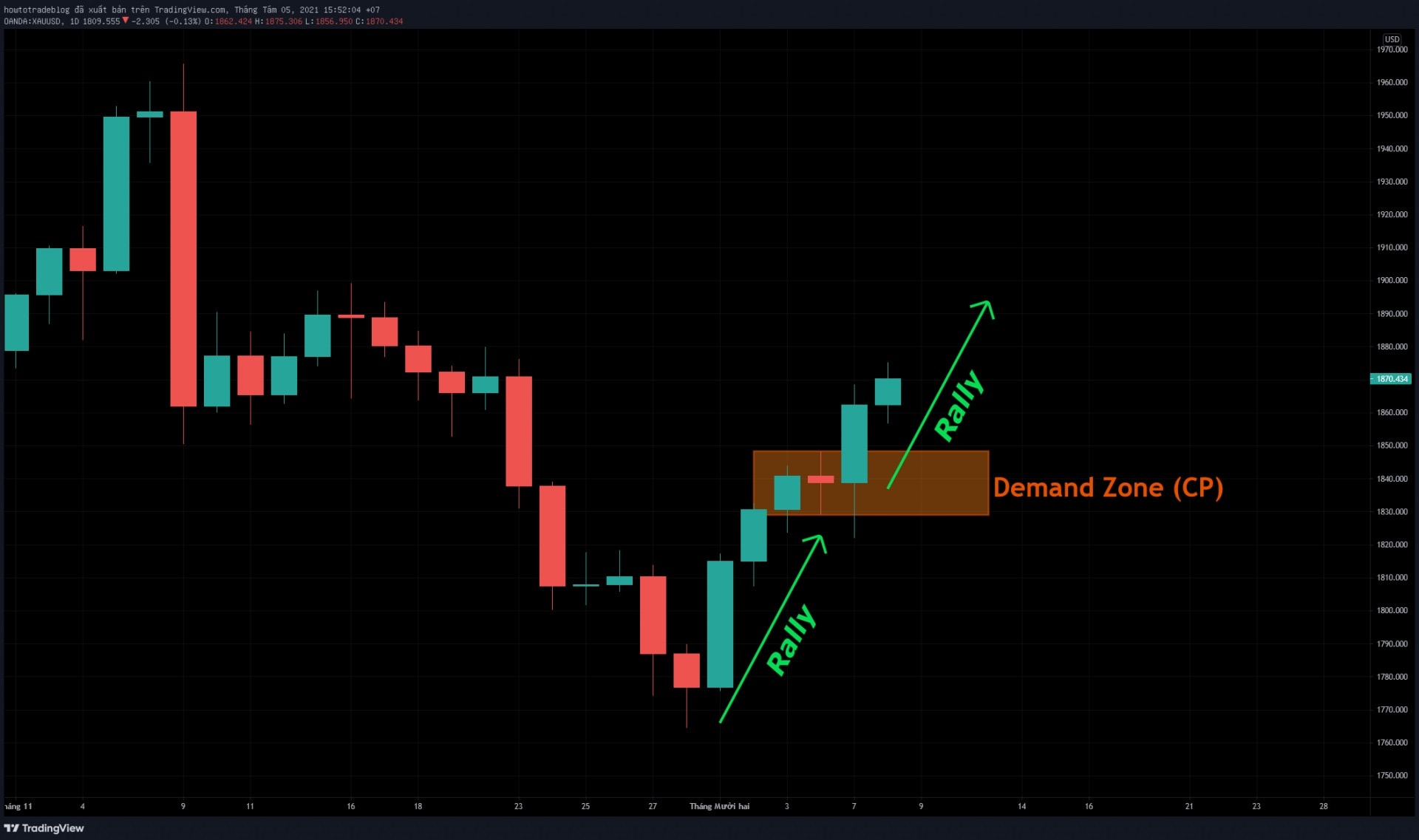 An example of the reversal Demand pattern[/caption]
When the market bounces back, it creates a long green candlestick. Then the Base will be the Demand zone (RP).
(2) Continuation Demand pattern (CP): Rally - Base - Rally
[caption id="attachment_16535" align="aligncenter" width="1280"]
An example of the reversal Demand pattern[/caption]
When the market bounces back, it creates a long green candlestick. Then the Base will be the Demand zone (RP).
(2) Continuation Demand pattern (CP): Rally - Base - Rally
[caption id="attachment_16535" align="aligncenter" width="1280"]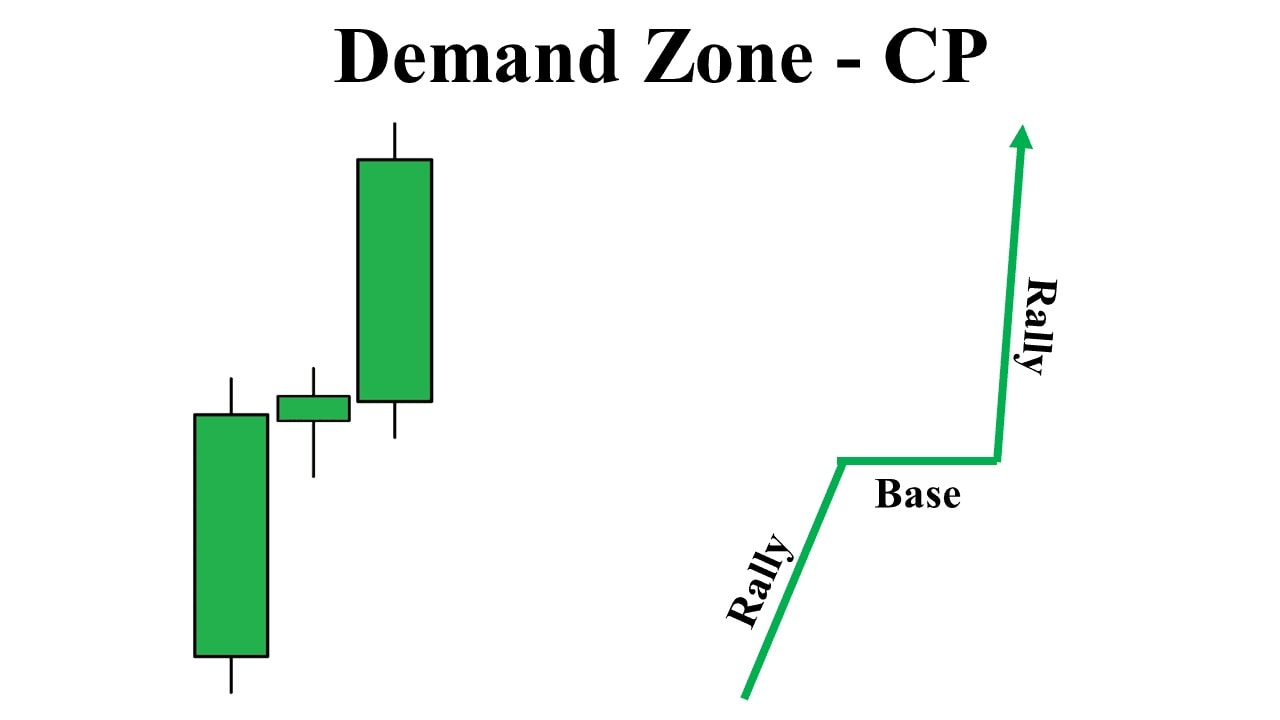 Continuation Demand pattern[/caption]
Detailed example:
[caption id="attachment_16536" align="aligncenter" width="1920"]
Continuation Demand pattern[/caption]
Detailed example:
[caption id="attachment_16536" align="aligncenter" width="1920"]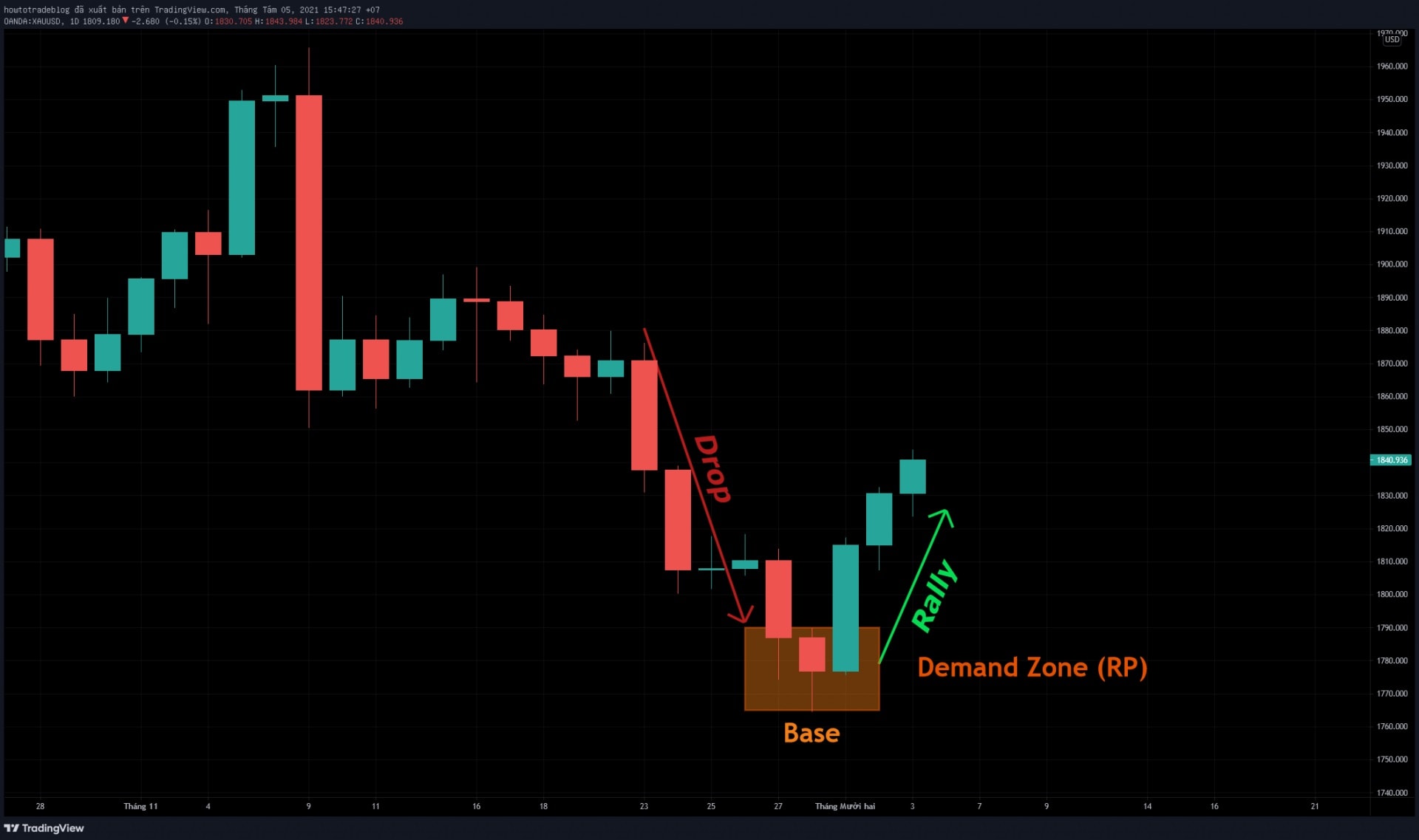 An example of the continuation Demand pattern[/caption]
An example of the continuation Demand pattern[/caption]
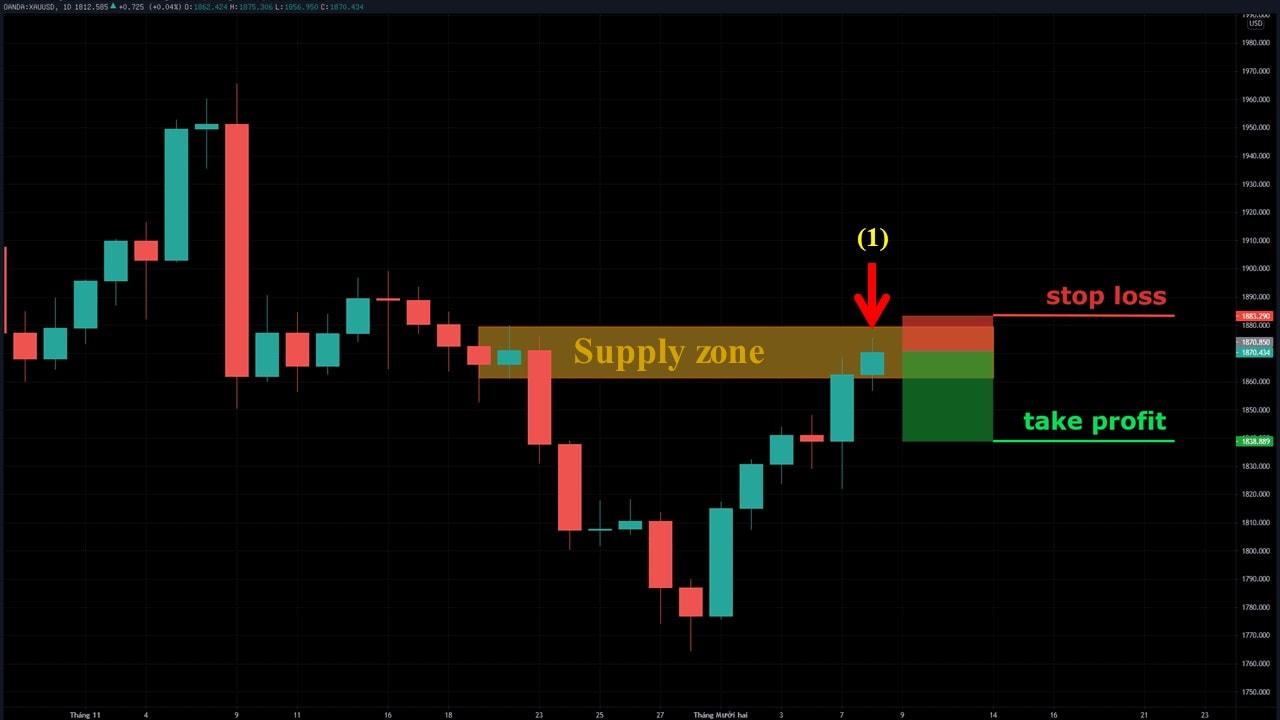 Trading with the Supply zone[/caption]
(2) Place 1 SELL order (Risk/Reward = 1:2)
+ Set the stop loss a few pips above the Supply zone to avoid being swept by the market.
+ Set the take profit to overlap the below Demand zone.
Result: The price drops sharply and touches TP.
[caption id="attachment_16538" align="aligncenter" width="1920"]
Trading with the Supply zone[/caption]
(2) Place 1 SELL order (Risk/Reward = 1:2)
+ Set the stop loss a few pips above the Supply zone to avoid being swept by the market.
+ Set the take profit to overlap the below Demand zone.
Result: The price drops sharply and touches TP.
[caption id="attachment_16538" align="aligncenter" width="1920"]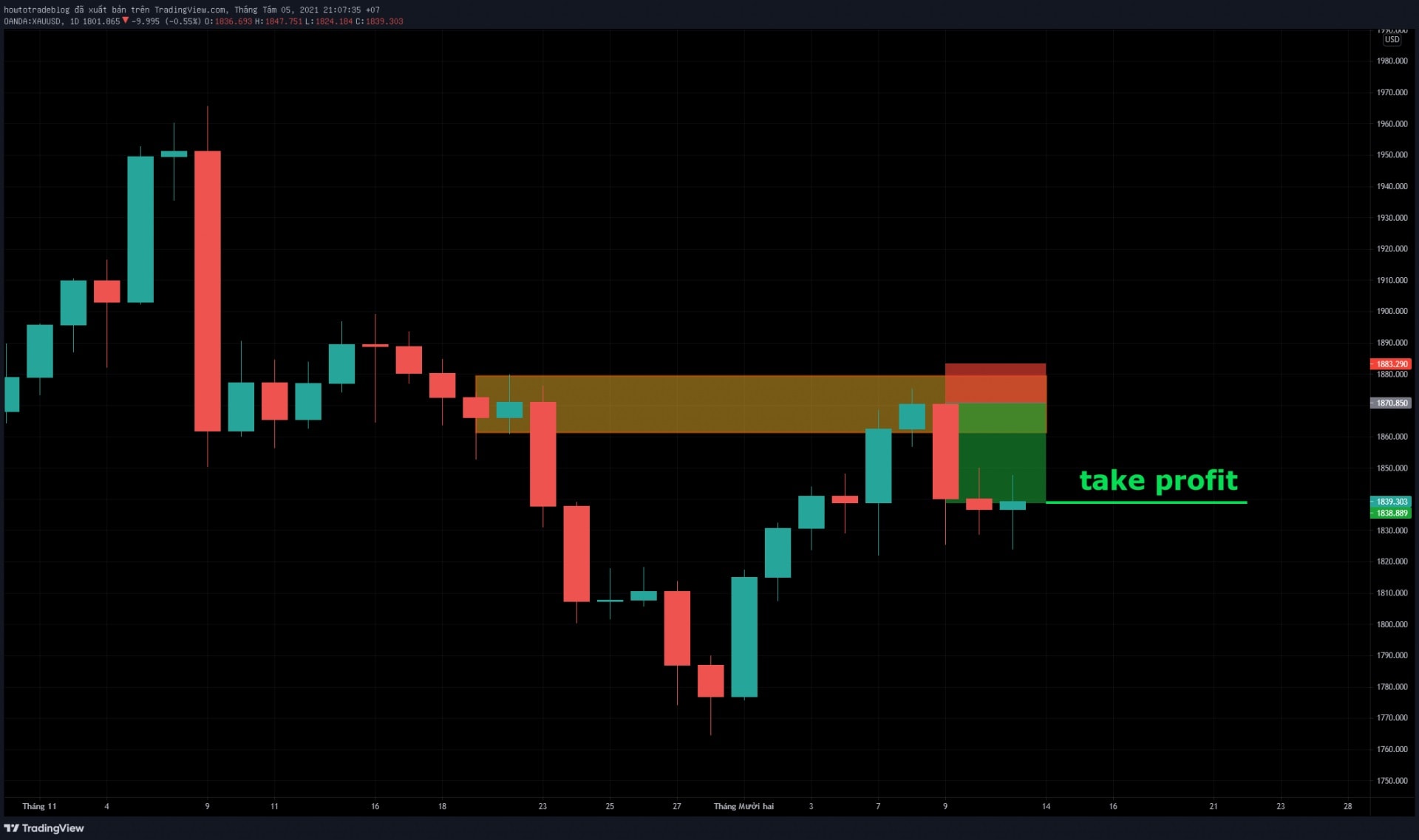 Trading result with the Supply zone[/caption]
I have another example about the gold price.
(1) The price increases and enters the Supply zone. Then it begins to show a slow increase signal with a small green candlestick.
[caption id="attachment_16539" align="aligncenter" width="1280"]
Trading result with the Supply zone[/caption]
I have another example about the gold price.
(1) The price increases and enters the Supply zone. Then it begins to show a slow increase signal with a small green candlestick.
[caption id="attachment_16539" align="aligncenter" width="1280"]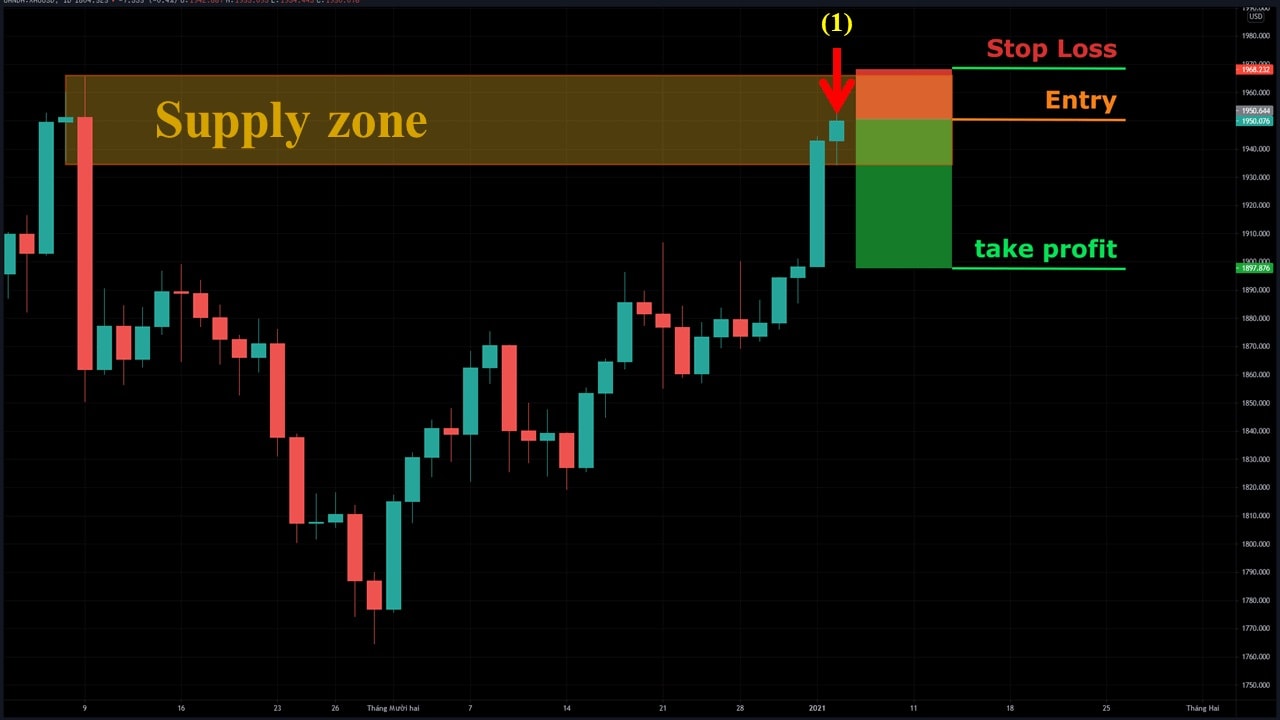 Sell Gold at the Supply zone[/caption]
(2) Place 1 SELL order (Risk/Reward = 1:3)
+ Set the stop loss a few pips above the Supply zone.
+ Set the take profit to overlap the below Demand zone (as the picture shown).
Result: The price falls sharply and hits TP.
[caption id="attachment_16540" align="aligncenter" width="1920"]
Sell Gold at the Supply zone[/caption]
(2) Place 1 SELL order (Risk/Reward = 1:3)
+ Set the stop loss a few pips above the Supply zone.
+ Set the take profit to overlap the below Demand zone (as the picture shown).
Result: The price falls sharply and hits TP.
[caption id="attachment_16540" align="aligncenter" width="1920"]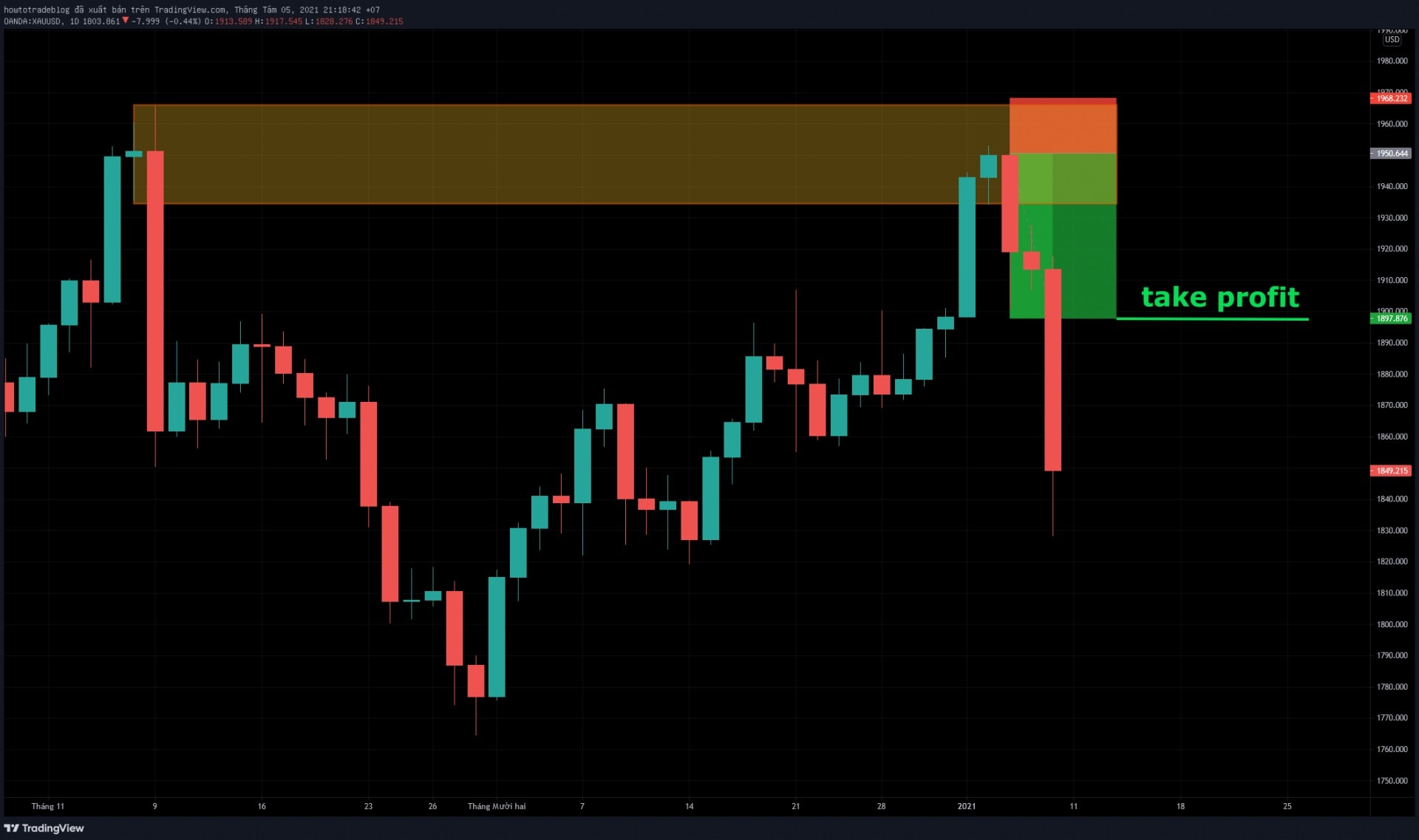 Trading result with the Sell order[/caption]
Trading result with the Sell order[/caption]
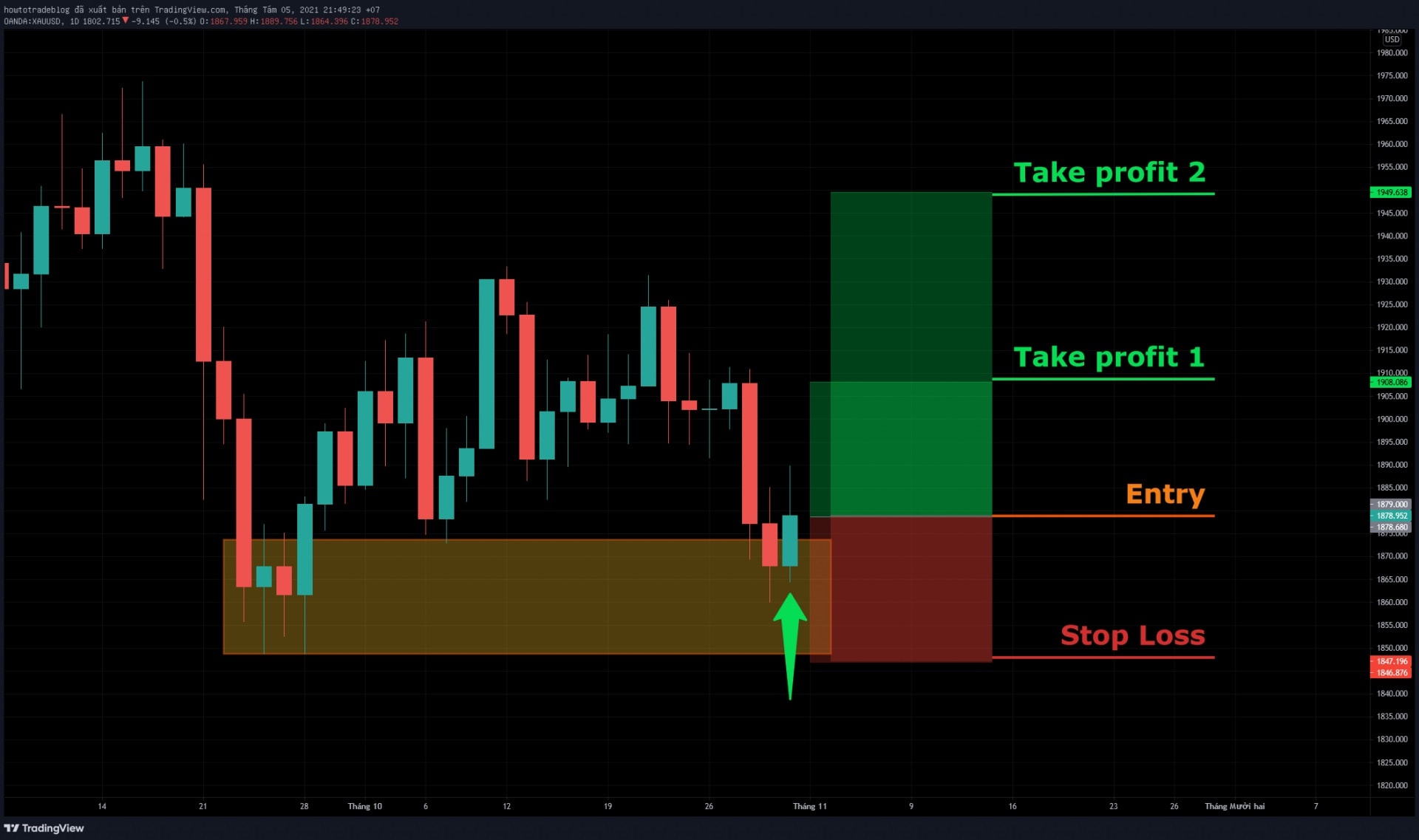 How to trade with the Demand zone[/caption]
Place the BUY order:
+ Set Stop Loss below the Demand zone.
+ Set Take Profit in 2 Supply zones.
As a result, the price increases and hits both TP1 and TP2.
[caption id="attachment_16542" align="aligncenter" width="1920"]
How to trade with the Demand zone[/caption]
Place the BUY order:
+ Set Stop Loss below the Demand zone.
+ Set Take Profit in 2 Supply zones.
As a result, the price increases and hits both TP1 and TP2.
[caption id="attachment_16542" align="aligncenter" width="1920"]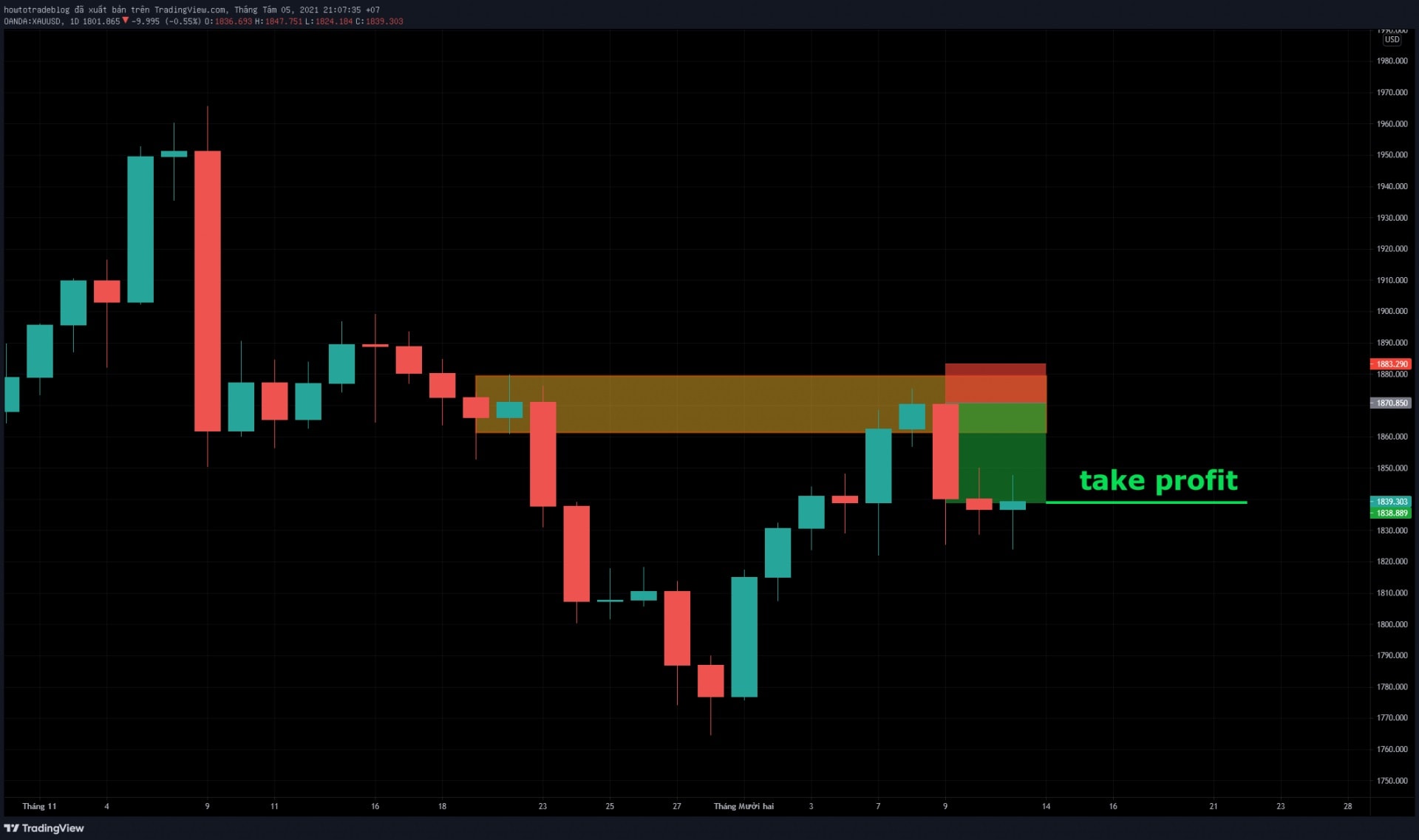 Result of the BUY order[/caption]
It is already quite long so I'll save the real trading experiences for the next article. We’ll also learn the reason why you should use a daily chart and when the Supply and Demand zones are no longer make sense.
Result of the BUY order[/caption]
It is already quite long so I'll save the real trading experiences for the next article. We’ll also learn the reason why you should use a daily chart and when the Supply and Demand zones are no longer make sense.
Register an Exness account NowGet $1,000 Free for beginners
How to identify the basic Supply and Demand zones
Identify the Supply zone
The Supply zone has 2 common patterns: (1) RP – Reversal and (2) CP – Continuation. (1) Reversal pattern (RP): Rally – Base – Drop [caption id="attachment_16529" align="aligncenter" width="1280"] Reversal Supply pattern[/caption]
The price moves sideways after an uptrend and creates a sideways candlestick zone called the Base. Then it falls dramatically with a long body candlestick. This Base is the reversal Supply zone (RP).
For example:
[caption id="attachment_16530" align="aligncenter" width="1920"]
Reversal Supply pattern[/caption]
The price moves sideways after an uptrend and creates a sideways candlestick zone called the Base. Then it falls dramatically with a long body candlestick. This Base is the reversal Supply zone (RP).
For example:
[caption id="attachment_16530" align="aligncenter" width="1920"] An example of the reversal Supply pattern[/caption]
The 6 candlesticks moving sideways in the image above are the Base. When the gold price falls sharply and creates a red candlestick with a long body, this Base becomes the reversal Supply zone.
(2) Continuation pattern (CP): Drop – Base – Drop
[caption id="attachment_16531" align="aligncenter" width="1280"]
An example of the reversal Supply pattern[/caption]
The 6 candlesticks moving sideways in the image above are the Base. When the gold price falls sharply and creates a red candlestick with a long body, this Base becomes the reversal Supply zone.
(2) Continuation pattern (CP): Drop – Base – Drop
[caption id="attachment_16531" align="aligncenter" width="1280"] Continuation Supply zone[/caption]
The price stops decreasing and creates sideways candlesticks. Then it continues to fall significantly. The sideways zone (Base) in this process will be the Supply zone.
Detailed example:
[caption id="attachment_16532" align="aligncenter" width="1920"]
Continuation Supply zone[/caption]
The price stops decreasing and creates sideways candlesticks. Then it continues to fall significantly. The sideways zone (Base) in this process will be the Supply zone.
Detailed example:
[caption id="attachment_16532" align="aligncenter" width="1920"] An example of the continuation Supply pattern[/caption]
An example of the continuation Supply pattern[/caption]
Identify the Demand zone
The Demand zone is similar to the Supply but we will focus on the strong bullish candlesticks. (1) Reversal Demand pattern (RP): Drop – Base - Rally [caption id="attachment_16533" align="aligncenter" width="1280"] Reversal Demand pattern[/caption]
For example:
[caption id="attachment_16534" align="aligncenter" width="1920"]
Reversal Demand pattern[/caption]
For example:
[caption id="attachment_16534" align="aligncenter" width="1920"] An example of the reversal Demand pattern[/caption]
When the market bounces back, it creates a long green candlestick. Then the Base will be the Demand zone (RP).
(2) Continuation Demand pattern (CP): Rally - Base - Rally
[caption id="attachment_16535" align="aligncenter" width="1280"]
An example of the reversal Demand pattern[/caption]
When the market bounces back, it creates a long green candlestick. Then the Base will be the Demand zone (RP).
(2) Continuation Demand pattern (CP): Rally - Base - Rally
[caption id="attachment_16535" align="aligncenter" width="1280"] Continuation Demand pattern[/caption]
Detailed example:
[caption id="attachment_16536" align="aligncenter" width="1920"]
Continuation Demand pattern[/caption]
Detailed example:
[caption id="attachment_16536" align="aligncenter" width="1920"] An example of the continuation Demand pattern[/caption]
An example of the continuation Demand pattern[/caption]
How to trade with the Supply and Demand zones
All we need to do is to watch for the strong bullish or bearish candlesticks. This is a sign of cash flow from large organizations. When the signal appears, it's time to look for entry points.How to trade with the Supply zone
After identifying the Supply zone, the main job is to wait for SELL opportunities. When the price returns to retest the Supply zone, find an appropriate entry point and place a SELL order. For example, the yellow zone is the Supply zone of gold (XAU/USD). (1) When the price returns to this zone and creates a small body candlestick, this could be a signal that it will stop increasing. [caption id="attachment_16537" align="aligncenter" width="1280"] Trading with the Supply zone[/caption]
(2) Place 1 SELL order (Risk/Reward = 1:2)
+ Set the stop loss a few pips above the Supply zone to avoid being swept by the market.
+ Set the take profit to overlap the below Demand zone.
Result: The price drops sharply and touches TP.
[caption id="attachment_16538" align="aligncenter" width="1920"]
Trading with the Supply zone[/caption]
(2) Place 1 SELL order (Risk/Reward = 1:2)
+ Set the stop loss a few pips above the Supply zone to avoid being swept by the market.
+ Set the take profit to overlap the below Demand zone.
Result: The price drops sharply and touches TP.
[caption id="attachment_16538" align="aligncenter" width="1920"] Trading result with the Supply zone[/caption]
I have another example about the gold price.
(1) The price increases and enters the Supply zone. Then it begins to show a slow increase signal with a small green candlestick.
[caption id="attachment_16539" align="aligncenter" width="1280"]
Trading result with the Supply zone[/caption]
I have another example about the gold price.
(1) The price increases and enters the Supply zone. Then it begins to show a slow increase signal with a small green candlestick.
[caption id="attachment_16539" align="aligncenter" width="1280"] Sell Gold at the Supply zone[/caption]
(2) Place 1 SELL order (Risk/Reward = 1:3)
+ Set the stop loss a few pips above the Supply zone.
+ Set the take profit to overlap the below Demand zone (as the picture shown).
Result: The price falls sharply and hits TP.
[caption id="attachment_16540" align="aligncenter" width="1920"]
Sell Gold at the Supply zone[/caption]
(2) Place 1 SELL order (Risk/Reward = 1:3)
+ Set the stop loss a few pips above the Supply zone.
+ Set the take profit to overlap the below Demand zone (as the picture shown).
Result: The price falls sharply and hits TP.
[caption id="attachment_16540" align="aligncenter" width="1920"] Trading result with the Sell order[/caption]
Trading result with the Sell order[/caption]
How to trade with the Demand zone
The first thing to do is to identify the Demand zone. The next is to wait for the BUY signal. When the price retests the Demand zone and creates a bullish reversal signal => Place a BUY order. We have an example of the Gold BUY order (XAU/USD). The price falls back to the Demand zone and creates a reversal signal. [caption id="attachment_16541" align="aligncenter" width="1920"] How to trade with the Demand zone[/caption]
Place the BUY order:
+ Set Stop Loss below the Demand zone.
+ Set Take Profit in 2 Supply zones.
As a result, the price increases and hits both TP1 and TP2.
[caption id="attachment_16542" align="aligncenter" width="1920"]
How to trade with the Demand zone[/caption]
Place the BUY order:
+ Set Stop Loss below the Demand zone.
+ Set Take Profit in 2 Supply zones.
As a result, the price increases and hits both TP1 and TP2.
[caption id="attachment_16542" align="aligncenter" width="1920"] Result of the BUY order[/caption]
It is already quite long so I'll save the real trading experiences for the next article. We’ll also learn the reason why you should use a daily chart and when the Supply and Demand zones are no longer make sense.
Result of the BUY order[/caption]
It is already quite long so I'll save the real trading experiences for the next article. We’ll also learn the reason why you should use a daily chart and when the Supply and Demand zones are no longer make sense.
Subscribe to:
Posts (Atom)